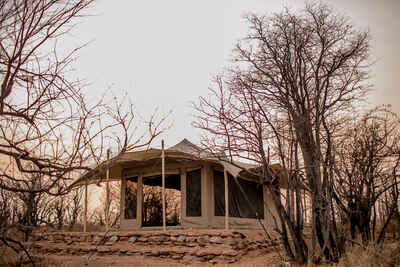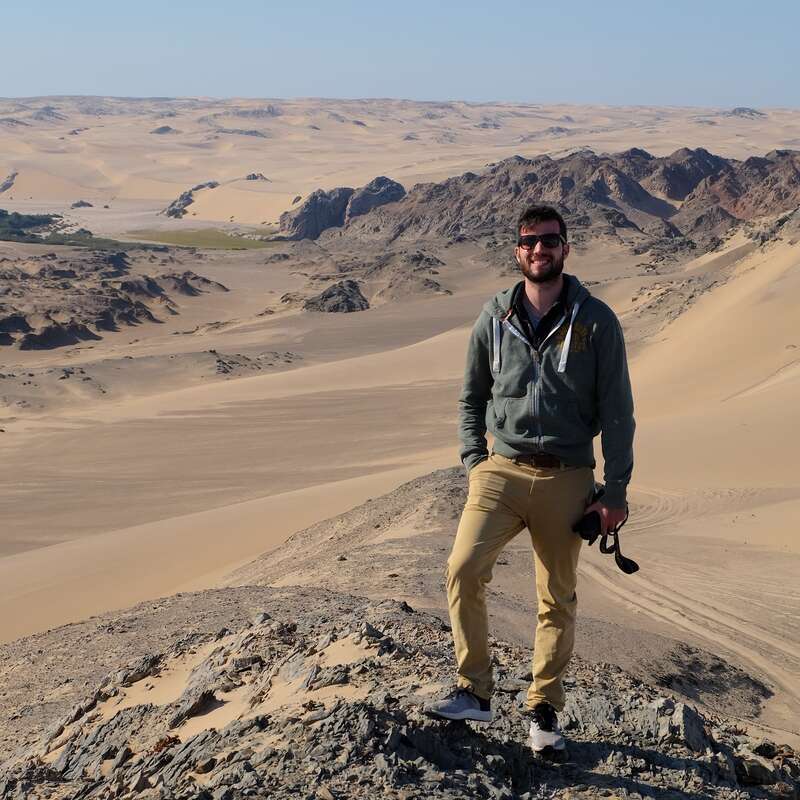About Camp Chitubu
First-rate guiding at Camp Chitubu ensures that the focus is firmly on the wildlife.
It's an ethos that permeates the whole camp, from top down, reflecting its part-ownership by renowned guide Julian Brookstein and his wife, Ashley. The couple also run the camp, bringing their years of experience in Hwange National Park to their own venture.
This is Hwange at its most rugged and remote. Exploring the park’s northern hills on foot or by 4WD can be heart-stopping, especially around the shores of Mandavu Dam where predators are on high alert for prey.
Back at camp, the feel is laidback and unpretentious, underpinned by sandy paths, tented rooms and a quirky self-service bar. Yet there’s comfort aplenty, from king-size beds in custom-designed tents to hand-painted basins in en-suite bathrooms.
The camp looks across a small waterhole to the surrounding hills, the natural world unfolding from every angle. As the sun rises, scan this landscape from your bed, then switch to the vista from the firepit as you enjoy an early-morning coffee.
Look beyond the communal table as you congregate for a delicious buffet lunch. Unwind mid-afternoon in the open-plan lounge, sheltered beneath a stretched canvas roof. Or relax in the privacy of your own shady veranda. Just make sure you have binoculars to hand.
Our view
Camp Chitubu has an enviable location in a remote corner of northern Hwange. While it is not a luxurious or extravagant camp, we found it to be both comfortable and unpretentious. The camp’s true appeal, however, lies in its sharp focus on exceptional guiding, reflecting the commitment of its part-owner and renowned guide, Julian Brookstein.
Accommodation
7 safari tents
Children
Besst for 12+
Open
All year
Activities

4WD Safari

Birdwatching

Guided walking safari

Night drive

Private activities
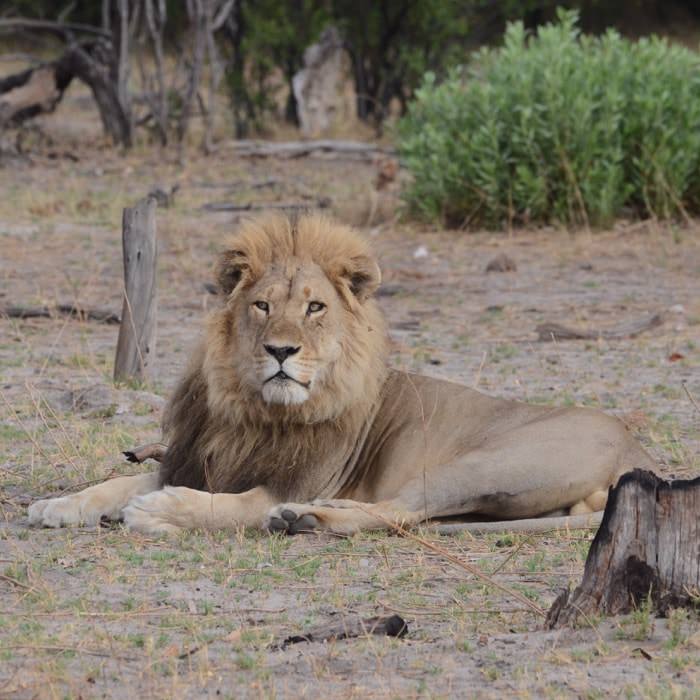
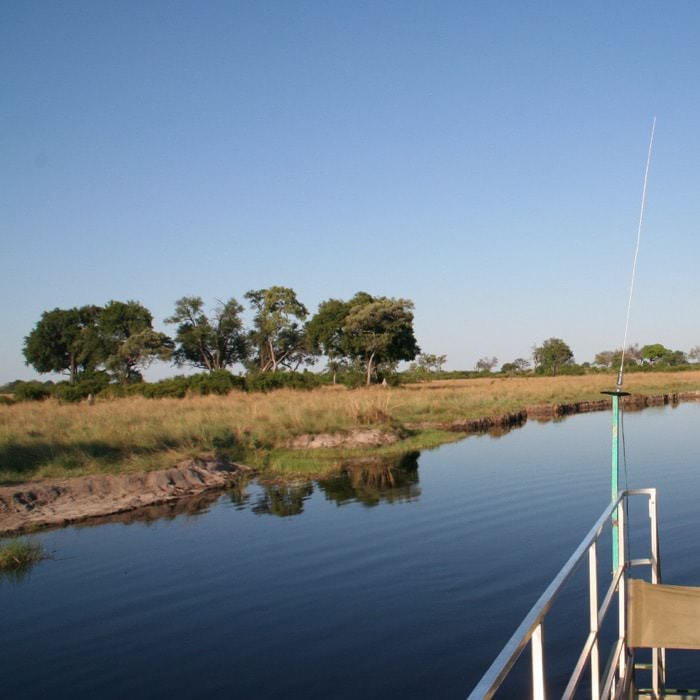
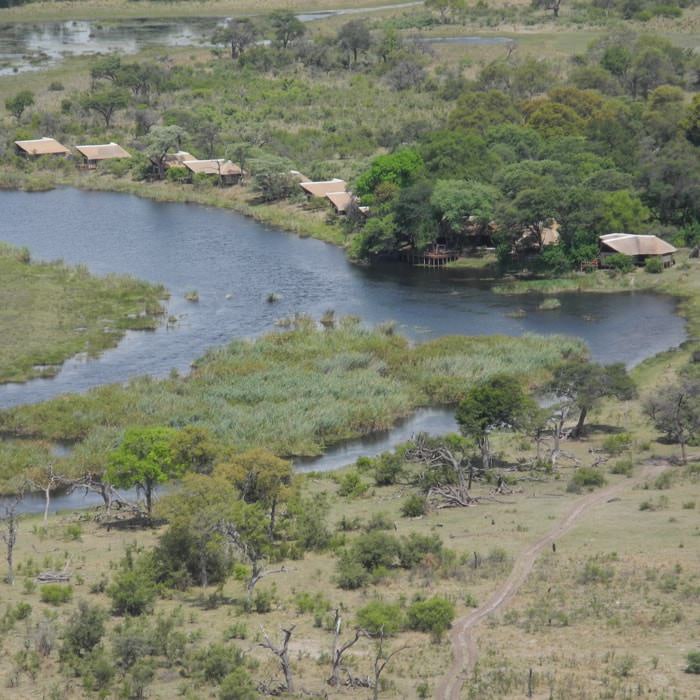
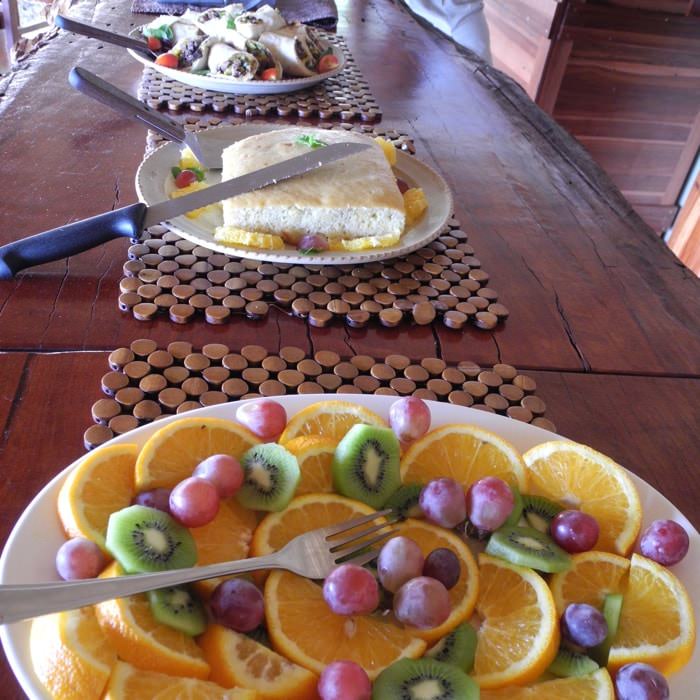
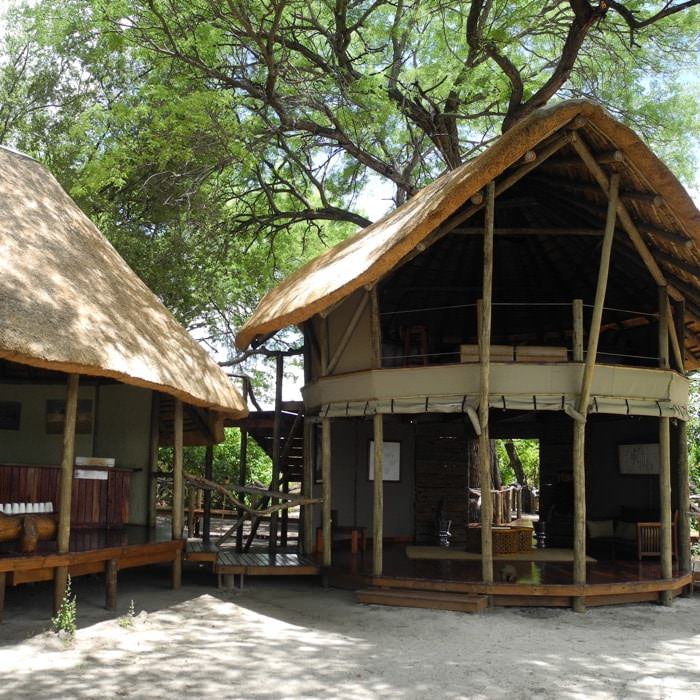
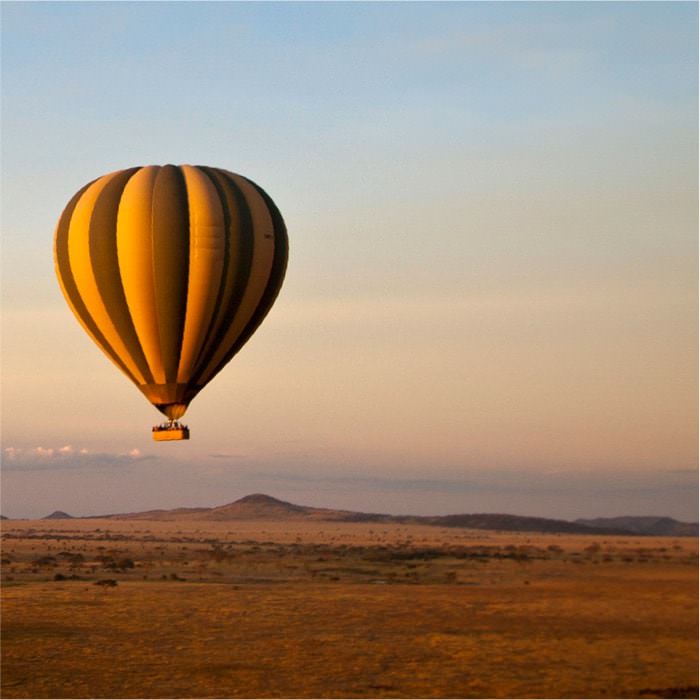
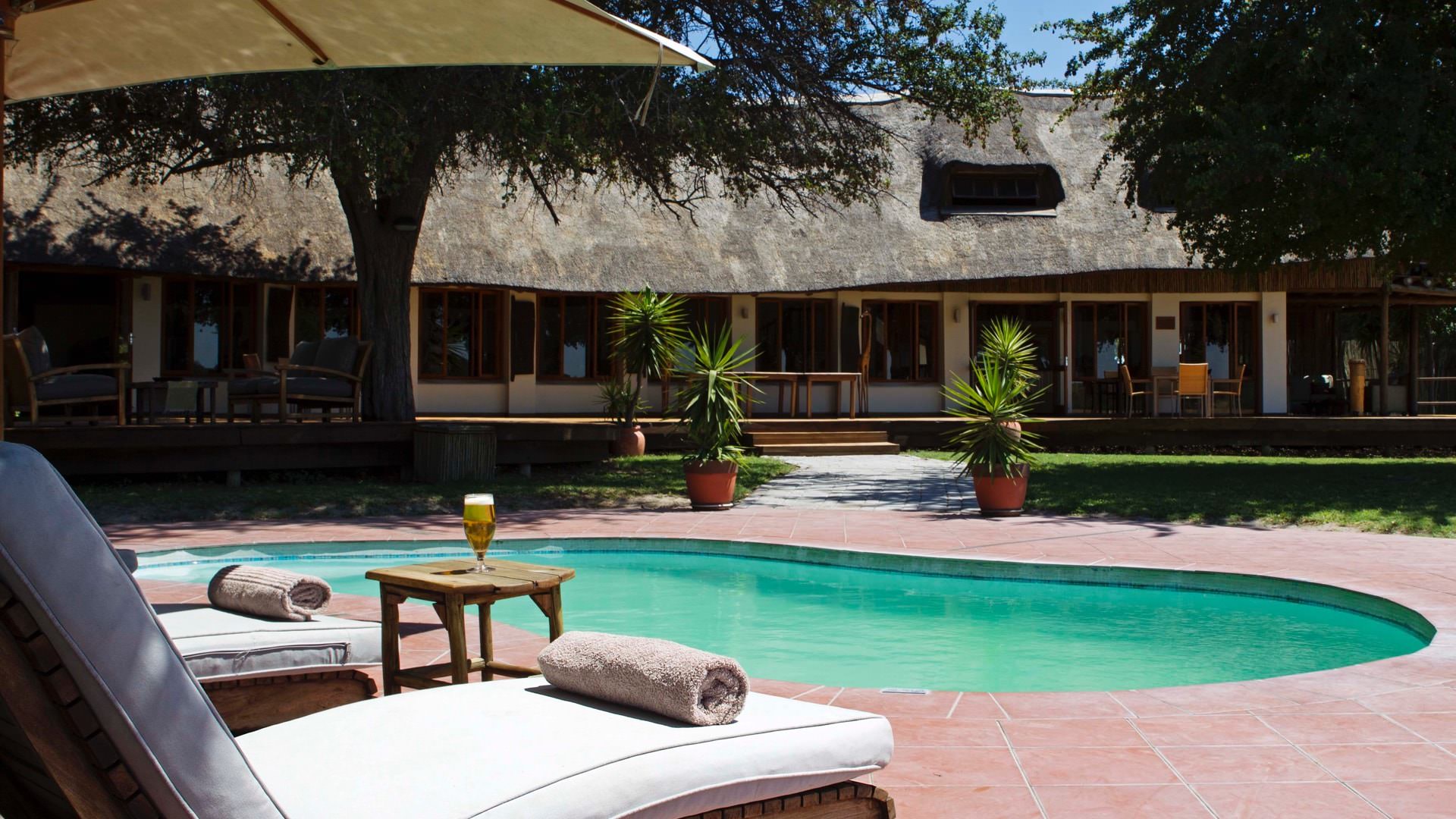
Expert Africa's gallery
When we travel we take lots of photos ourselves to give you a real and un-edited view of the safaris. See our 0 pictures of Camp Chitubu to get the candid view.
View galleryCamp Chitubu: Our full report
Set in the rugged northern reaches of Zimbabwe’s Hwange National Park, Chitubu is close to Mandavu Dam.
The camp opened in 2022, and is part-owned and run by renowned guide Julian Brookstein and his wife, Ashley, with a focus on exploring the surrounding hills on foot and by vehicle with a top-quality guide.
We first met Julian and Ashley Brookstein while they were managing Camp Hwange in the mid-2010s, when Julian was also one of the camp's top guides. Since then, Julian and Ashley have branched out to establish their own business, with Camp Chitubu being their first venture in Hwange National Park. Though it’s not their first camp in Zimbabwe, they've said that returning to Hwange felt like coming home. You can certainly feel the influence of their time at Camp Hwange – and that's not a bad thing.
Camp Chitubu overlooks a small waterhole in the Sinamatella region of Hwange, Accommodation at Camp Chitubu consists of six standard tents and one family tent - though these "tents" are far from basic. Each is custom-designed and features large mesh windows, allowing the sounds of the bush to filter in and providing a natural breeze during the hotter summer months (October to March). In front of each tent, sheltered beneath a canvas roof, are a couple of campaign chairs for soaking in the scenic view.
Inside, a king-size or twin beds are flanked by bedside tables with reading lamps, and the gauze windows and door flaps keep insects at bay, so there's no need for a mosquito net. In one corner of the bedroom, you'll find a luggage rack with an integrated safe, along with mosquito repellent, bug spray, and an emergency air horn. Although there is plenty of storage space, we thought additional lighting would be helpful at night for finding items in the luggage; a headtorch proved invaluable. A comfortable chair and a small table with a flask of iced water—topped up daily or on request—complete the space.
At the back of each tent, behind a partition, is an en-suite bathroom. A large vanity unit is equipped with twin hand-painted sinks and a mirror. To one side you'll find the toilet; to the other, a shower. It's worth noting that the toilet is not in a separate cubicle, and the shower area is not entirely screened off from the main bedroom – a semi-open set-up that may not be to everyone's taste. We also felt that the shower area could benefit from better screening to prevent water from splashing. Additionally, the bathmat placed by the shower was extremely slippery on the bathroom floor, which we've flagged and hope will be addressed for safety.
During our visit in July 2023, the family tent was still under construction, but this is now complete. Located slightly away from the other tents for added privacy, it consists of one double and one twin room, with a shared bathroom.
Sandy paths connect all the tents to the main area: a large, open-plan space beneath a stretched canvas roof with expansive views. On one side, a cosy lounge area with comfy sofas offers a relaxing place to unwind, while on the other is a large communal dining table where buffet-style meals are served. At the back, a quirky self-service bar comes into its own. The open, airy feel of the whole area combines with sandy floors and a relaxed atmosphere to give a welcoming and laid-back vibe.
Just a few steps down from the main area you'll find the camp's firepit, surrounded by comfy chairs that are perfect for an evening aperitif or a morning coffee to kick-start the day.
Activities at Camp Chitubu focus primarily on game drives and walking safaris. During our stay, we enjoyed a thrilling walk while tracking a large herd of buffalo near Mandavu Dam. As we progressed, we realised we weren't the only ones stalking the herd, and our walk culminated in an exciting – albeit largely obscured and unsuccessful – lion hunt. Although our stay was short, it was clear that this area offers plenty of wildife action. It was a true pleasure to be out with Julian, one of Hwange's top guides. While Julian doesn't guide all visitors to Camp Chitubu, he is there as often as he can be, and when he's not, he ensures that equally skilled guides are there to take his place.
Activities
4WD Safari
Birdwatching
Guided walking safari
Night drive
Private activities
Families & children
- Attitude towards children
- Camp Chitubu welcomes children of all ages.
- Property’s age restrictions
- Under 18s must share a room with a responsible adult when staying here.
Children aged 13 and under are not permitted on walking safaris. Families with children under 12 are usually required to book private activities at an addtional cost. - Special activities & services
- None
- Equipment
- Camp Chitubu can provide a camp bed for children to share a room with their parents. This would make the tents feel a little cramped, and there is limited privacy between the bedroom and the shower, so this isn't an ideal solution.
- Generally recommended for children
- Julian and Ashley raised their own children in the bush so families will feel welcome at Camp Chitubu.
- Notes
- The camp is unfenced, so children must be supervised by a parent or guardian at all times.
Food & drink
- Usual board basis
- Full Board & Activities
- Food quality
- During our visit in July 2023, we enjoyed a range of simple, well-presented and delicious meals. With advanced notice, Camp Chitubu can cater for a variety of dietary requirements.
The day started with a quick hot drink and a muffin before heading out early on a game drive. After the drive, we returned to camp for a breakfast of toast, pancakes, fresh fruit, cereals and yoghurts. Eggs, sausage, tomatoes, and bacon were also offered and cooked to order.
We only stayed for one night during our visit, so we didn't have a chance to enjoy lunch. However, options typically include light meals such as salads, pasta or quiche. Lunch packs can be arranged on request.
Dinner at Chitubu is typically a three-course meal. We enjoyed an excellent tomato soup with cheese crisp and a freshly baked bread roll. This was followed by a well-cooked chicken dish with chimichurri, creamed spinach and boiled carrots – although for our tastes there was perhaps a little too much garlic in the chimichurri. Finally, we had a melt-in-the-middle chocolate fondant with vanilla ice cream, a crowd-pleasing classic that hit the mark. - Dining style
- Group Meals
- Dining locations
- Indoor and Outdoor Dining
- Further dining info, including room service
- Private dining and meals in the bush are available on request.
Getting there
- Location
- Hwange National Park, Zimbabwe
- Ideal length of stay
- Given the remote nature of the camp, we'd suggest at least three nights here.
- Directions
- Most travellers staying at Camp Chitubu will fly to Sinamatella Airstrip or one of northern Hwange's other airstrips before transferring to the camp in an open-sided game-viewing vehicle.
- Accessible by
- Fly-and-Transfer
Communications
- Power supply notes
- There is a back-up generator.
- Communications
- There is WiFi in the main area and in the tents.
- TV & radio
- None
- Water supply
- Borehole
- Water supply notes
- Each tent has an en-suite bathroom with solar-heated hot running water for the shower and basins, and a flush toilet.
Health & safety
- Malarial protection recommended
- Yes
- Medical care
- There is a first-aid kit on site and the guides are trained in first aid.
- Dangerous animals
- High Risk
- Security measures
- All guests are accompanied to and from their tents at night by an armed guide. Air horns are provided in the chalets to attract attention in case of an emergency.
- Fire safety
- There are fire extinguishers in all of the chalets and in the main area at Camp Chitubu.
Useful info
- Disabled access
- On Request
- Laundry facilities
- A same-day laundry service is offered subject to the weather.
- Money
- There is a small safe in each tent for money and personal effects.
- Accepted payment on location
- Any additional payments are rare here; most things are included. If required, payments and tips are best made in US dollars cash; card payments by Visa and Mastercard can be taken but are processed off-site.
Plan and book your trip with Expert Africa
All of our trips are tailor-made, so we'll always adapt them to suit you. Talk to an Expert and let us plan and arrange your perfect trip.

Talk to an Expert
Call or email us now! We’ll match you with the Specialist in our team who is best suited to help you. Then together we can start planning your trip.

Set up your itinerary
Based on our experience and your ideas, your specialist will create a detailed, costed itinerary. We’ll refine it together, until we have a trip that you’re perfectly happy with.

Prepare for your trip
The same Specialist will make the seamless arrangements for your trip, send you detailed travel documents, and be available to answer any questions before you depart.

Travel with peace of mind
After you set off, you’ll be cared for by our partners in Africa, most of whom have worked with Expert Africa for decades. And if you ever need us urgently, we’re available 24/7.

When you return
We love to learn about your trip, and so will always be grateful if you’ve the time to give feedback to your Specialist when you return.
Camp Chitubu's location
Look closer at the environment and surroundings of Camp Chitubu.
Other lodges in Hwange National Park
Alternative places to stay in this same area.
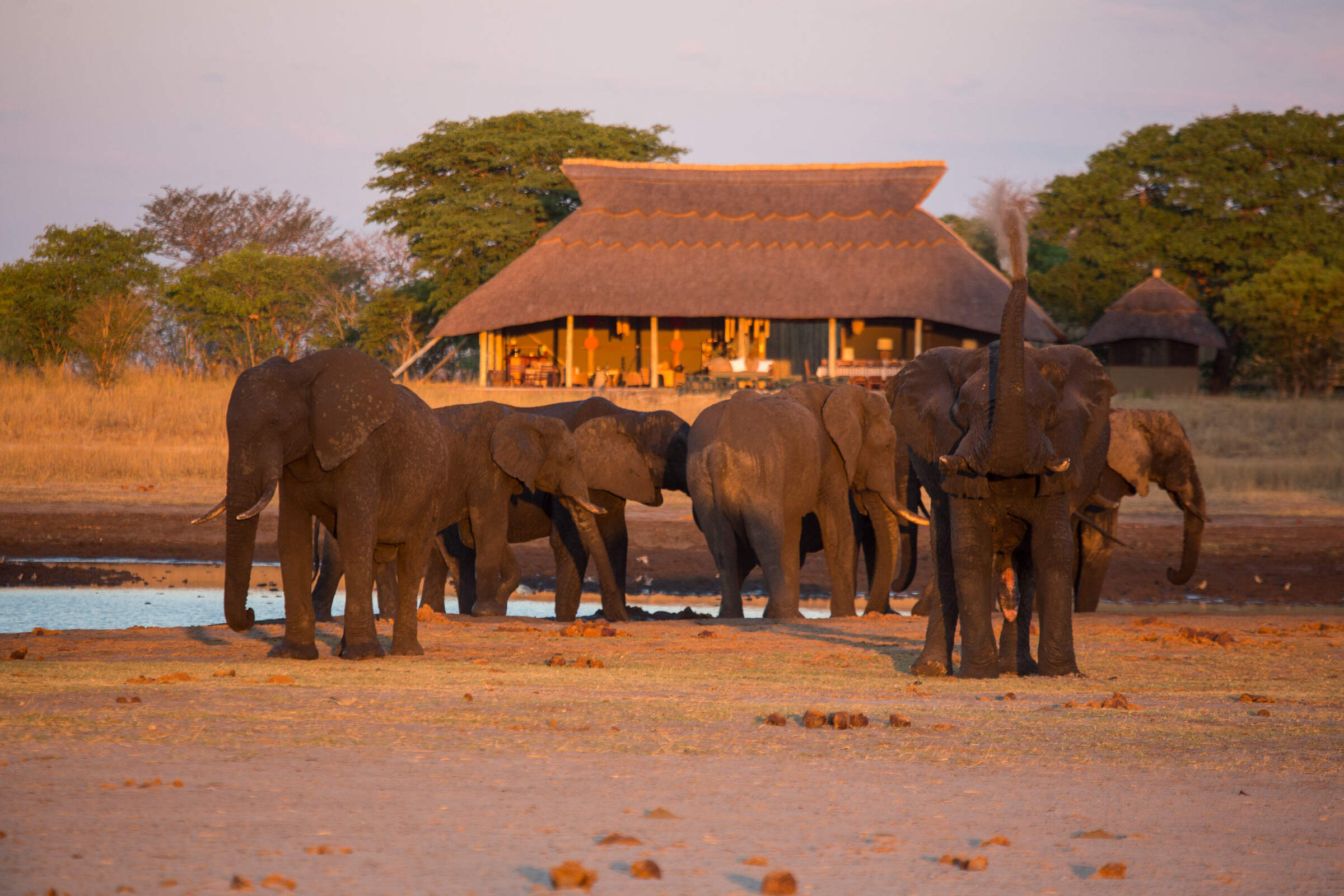
Camp Hwange
Overlooking a waterhole in a remote part of Hwange National Park, Camp Hwange offers great guiding in a pristine wilderness at reasonable prices.
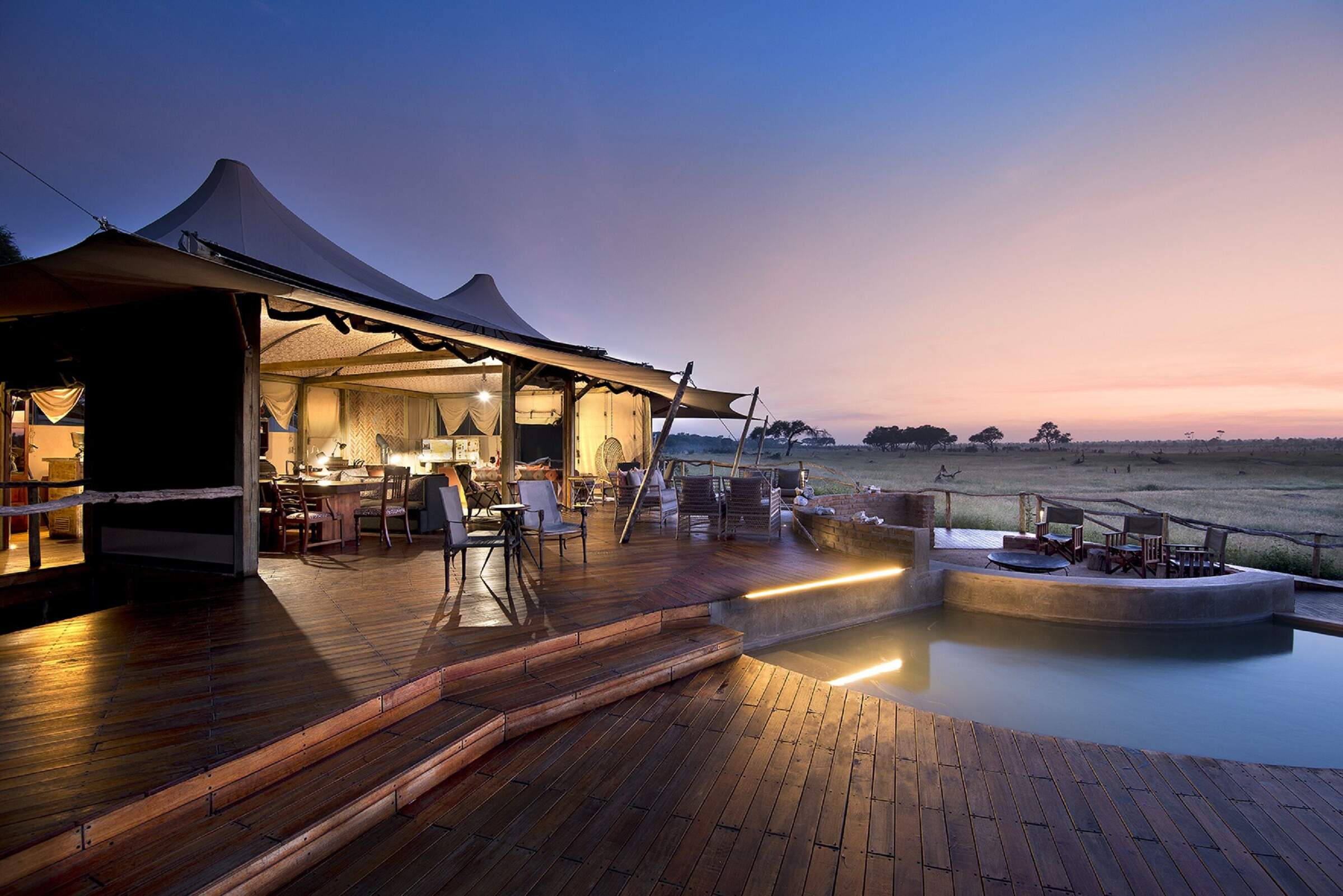
Somalisa Camp
Somalisa is a luxurious, yet remote, safari camp in Hwange National Park, offering walking safaris and game drives.
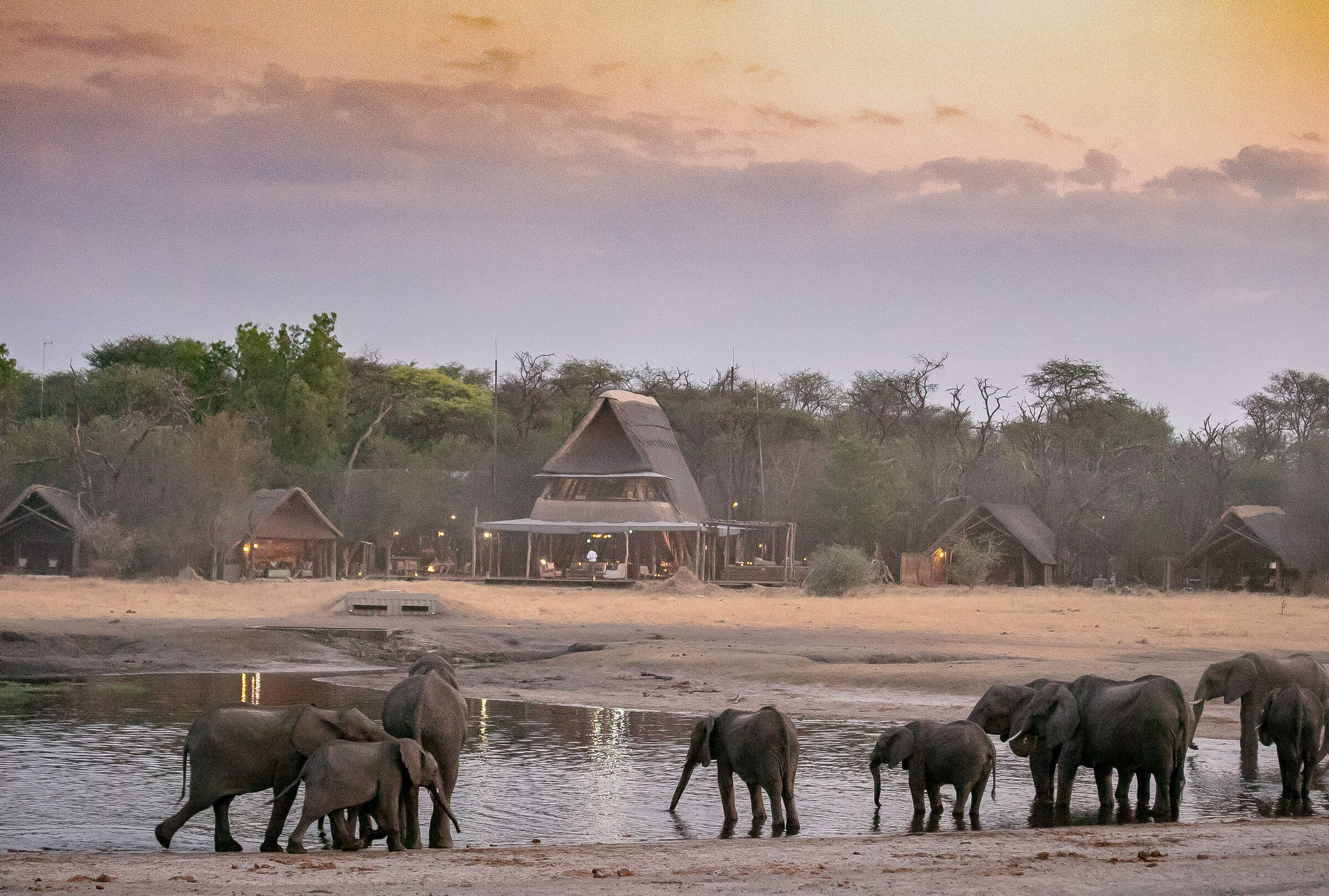
The Hide
Located in a small, private concession, The Hide is a relaxed and comfortable camp offering submerged hides and great family accommodation.
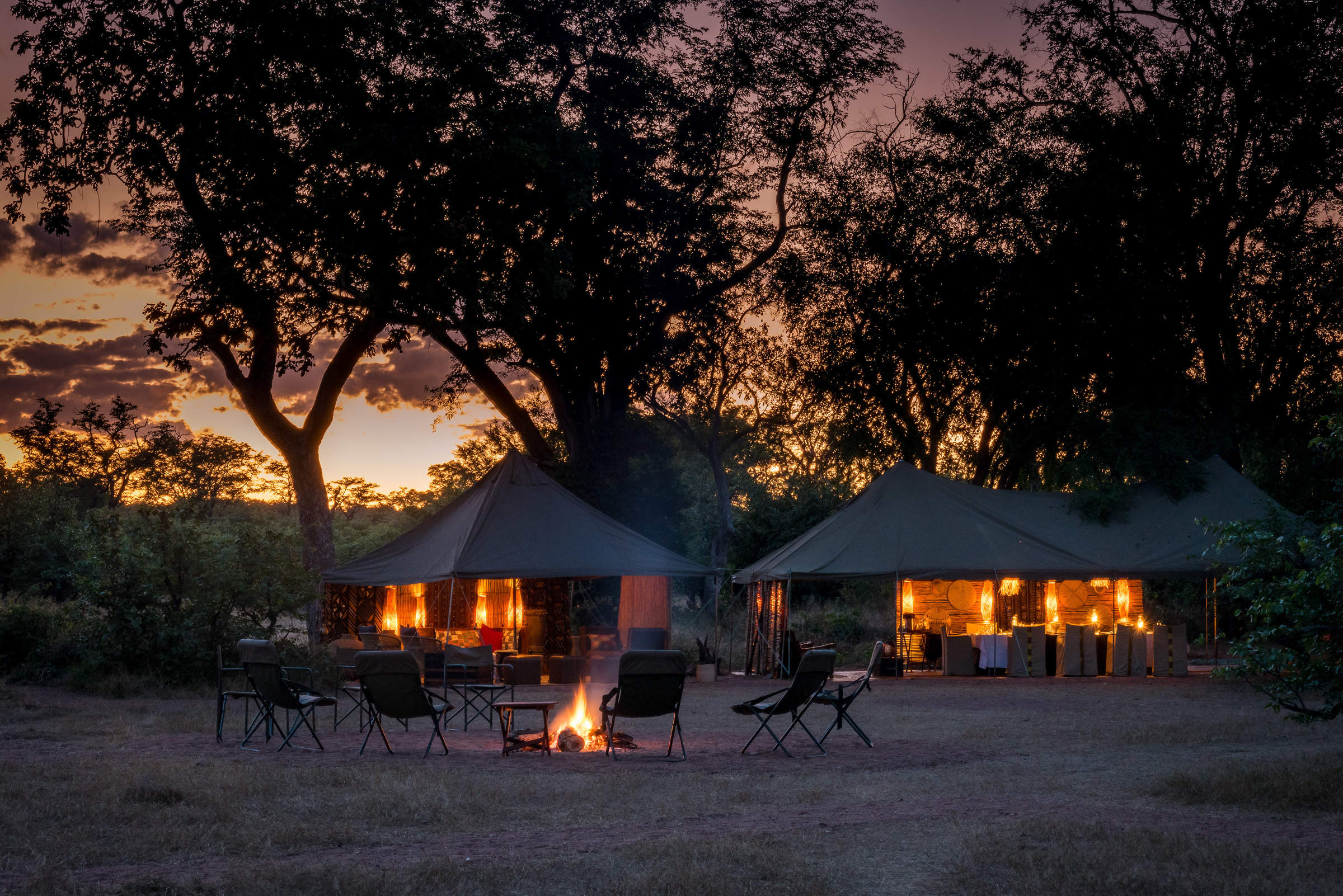
Hwange Bush Camp
Hwange Bush Camp is a small seasonal camp offering comfortable tents, great food, and superb guiding, and is often used by exclusive groups.
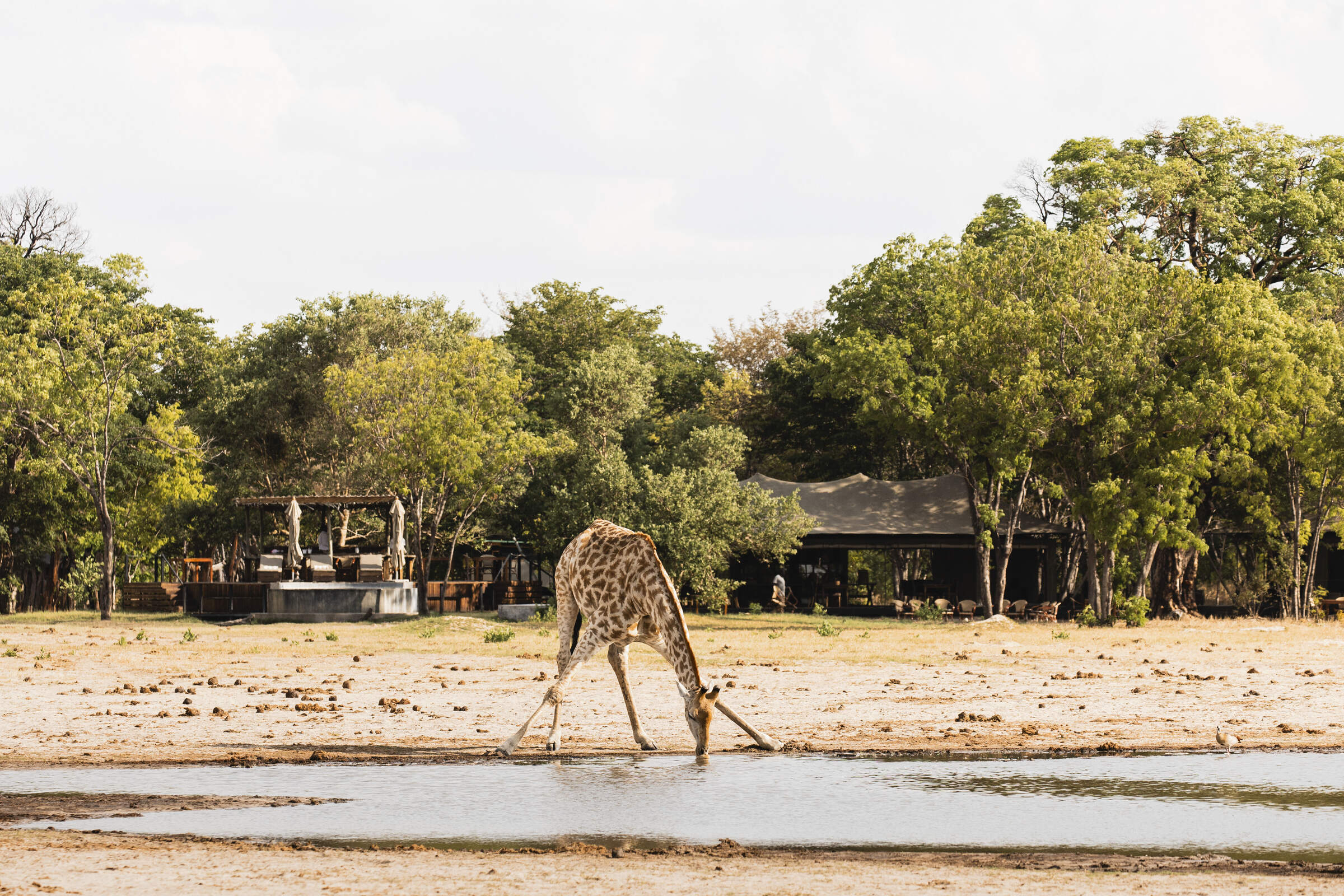
Little Makalolo Camp
Tucked away in Hwange National Park overlooking a waterhole, Little Makalolo Camp combines top guiding with excellent wildlife watching.
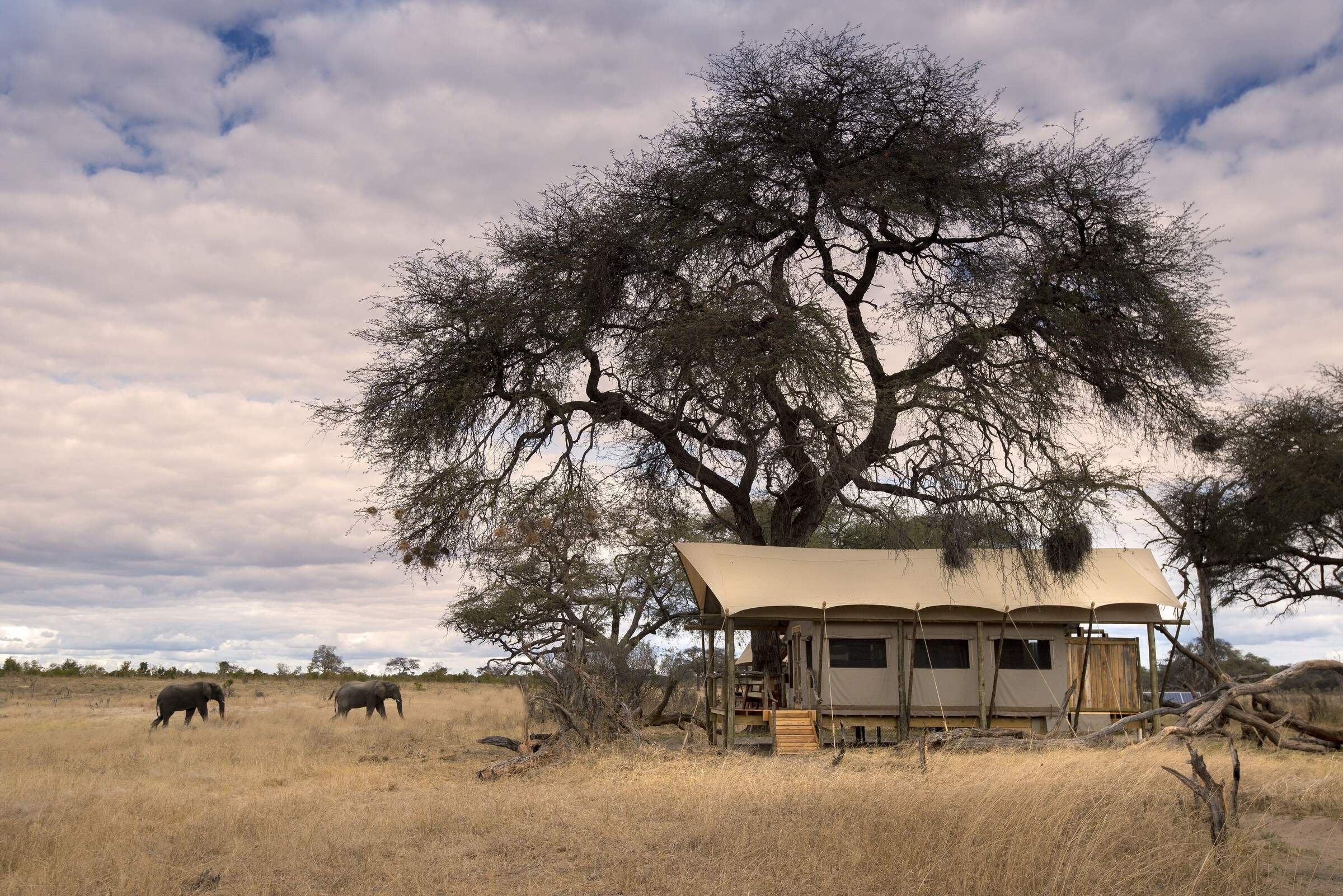
Somalisa Expeditions
A simple but stylish camp, Somalisa Expeditions sits in the heart of Hwange National Park, offering walking safaris and game drives.
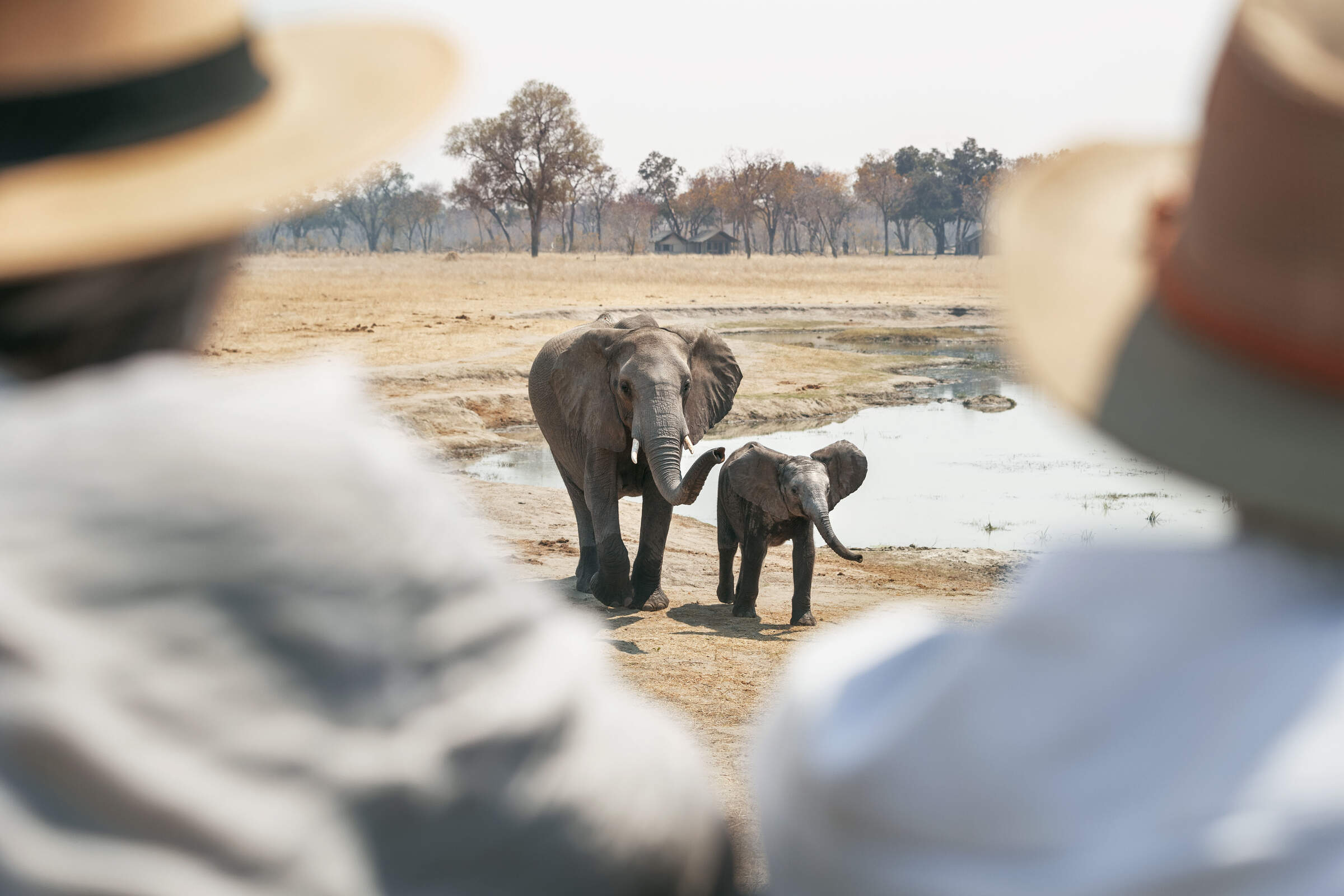
Davison's Camp
Within the Linkwasha Concession, Davison's Camp offers superb value for money, morning walking safaris and spot-lit drives after dark.
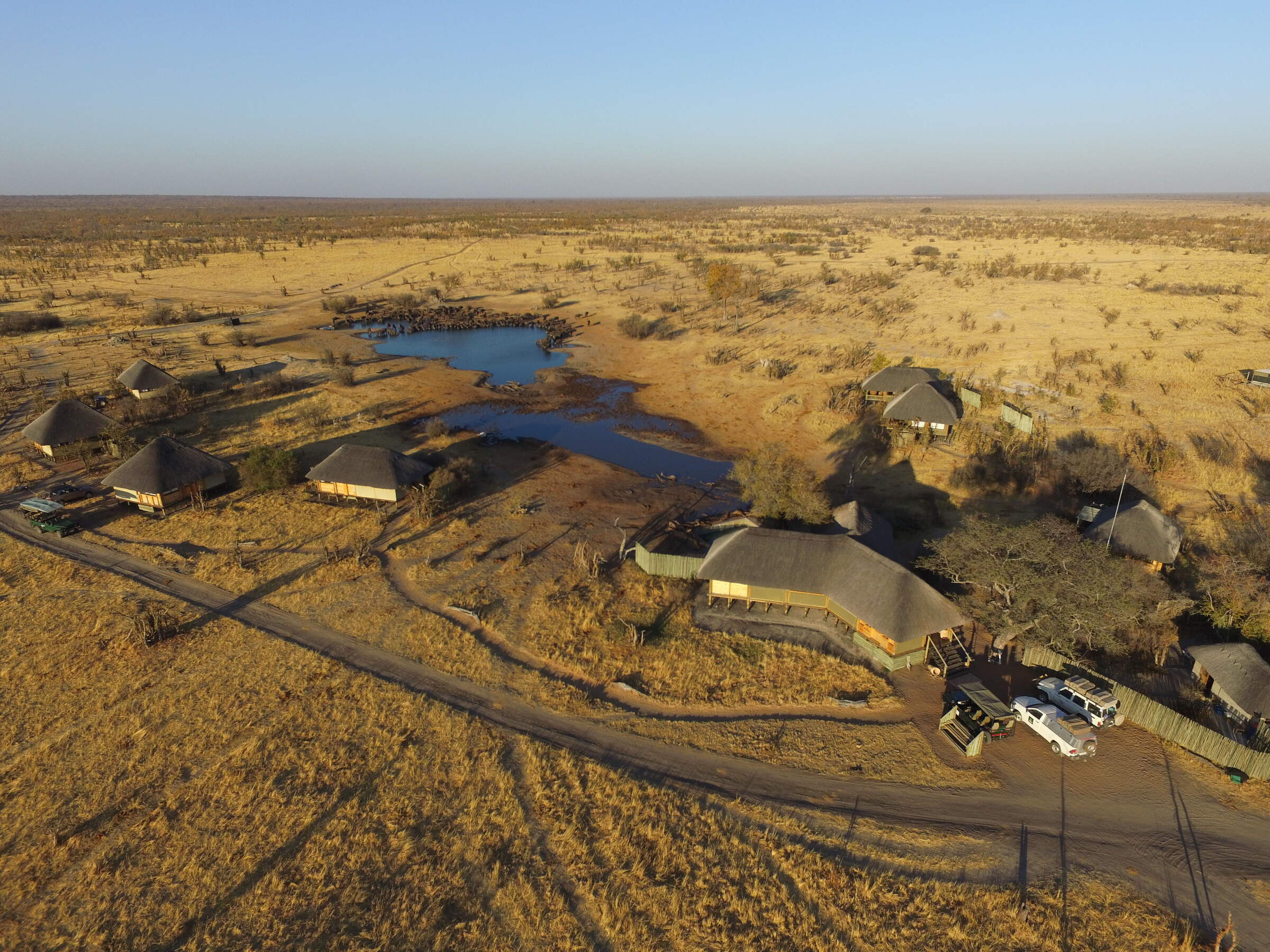
Nehimba Lodge
Nehimba is a comfortable, good-value camp in a remote area of Hwange National Park, teeming with wildlife.
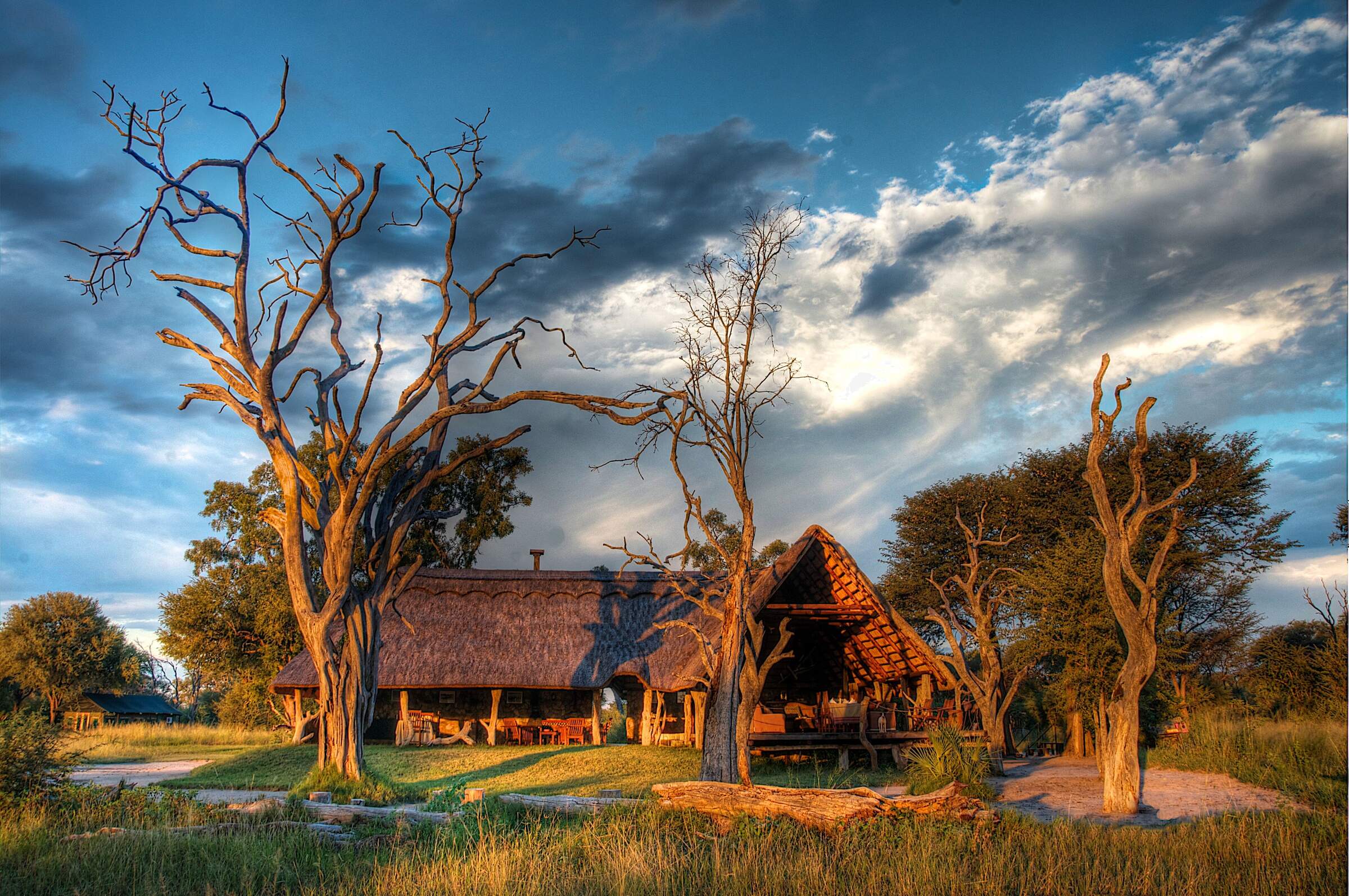
Bomani Tented Lodge
Bomani is a down-to-earth lodge with a range of activities in a remote region of western Zimbabwe, adjacent to Hwange National Park.
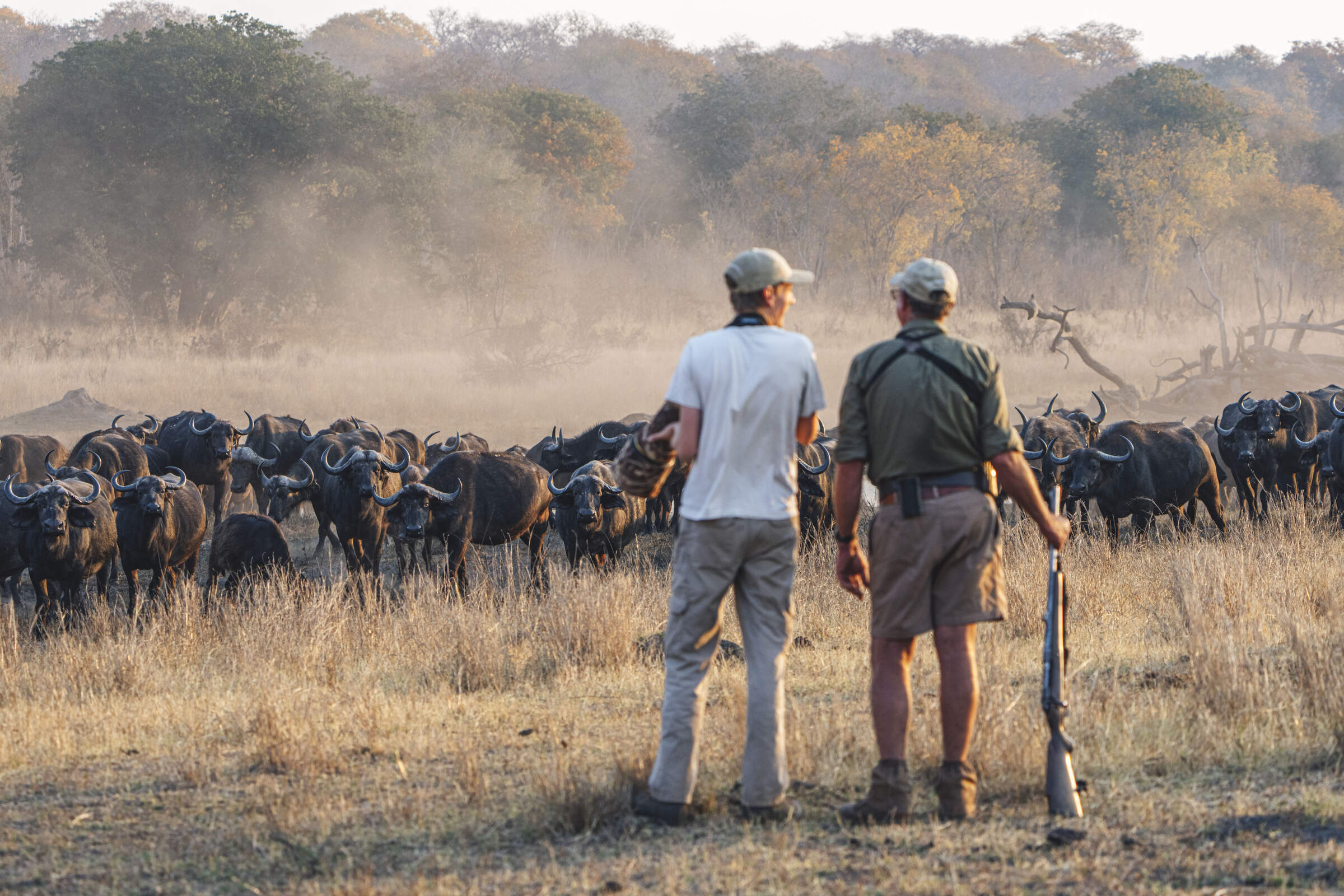
Khulu Bush Camp
Just outside Hwange National Park, Khulu Bush Camp features a waterhole popular with wildlife, especially elephants and offers excellent value for money.
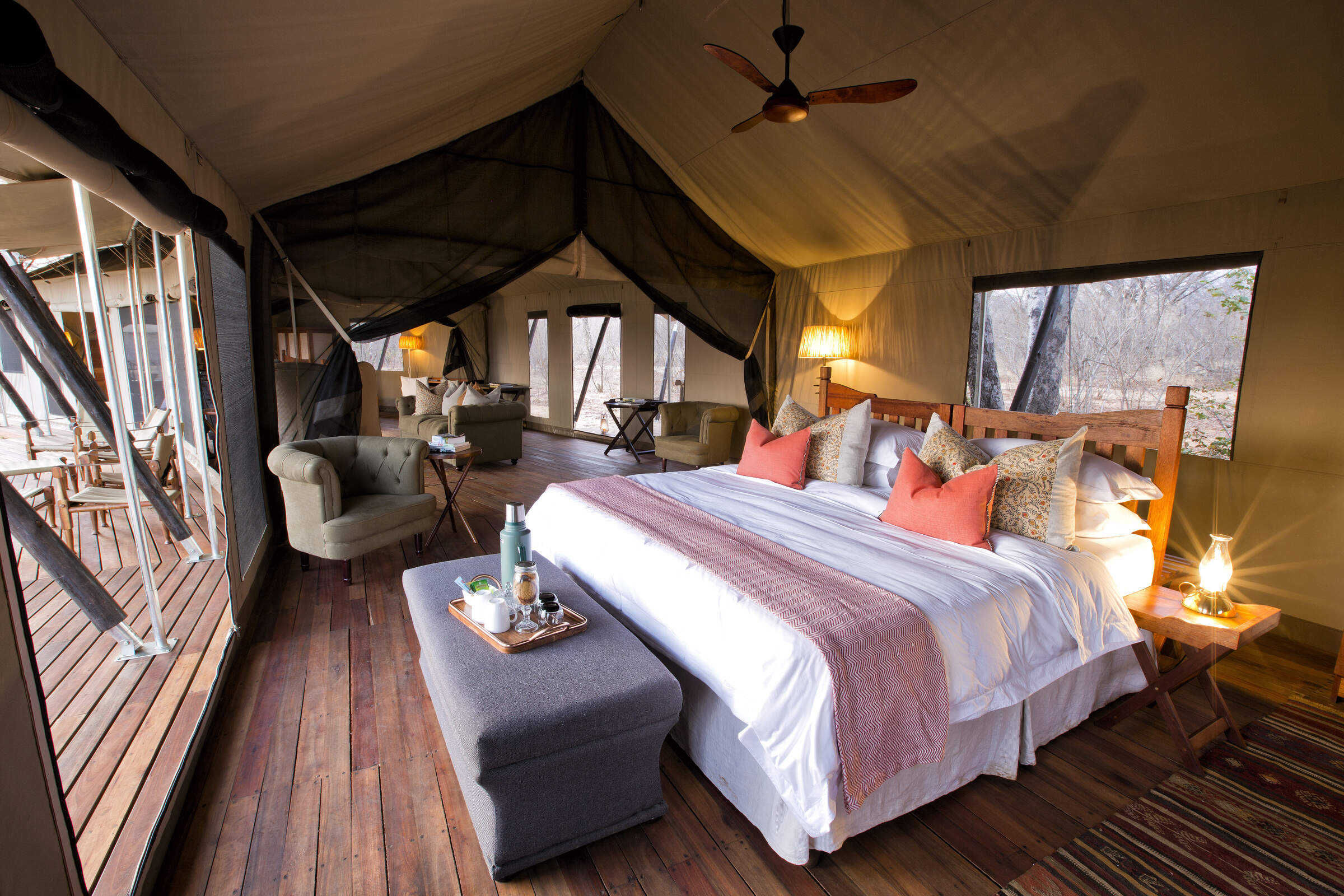
Verney's Camp
Verney's Camp is one of the newest offerings in Hwange, located in the wildlife rich, open landscape in the south-eastern section of the park.
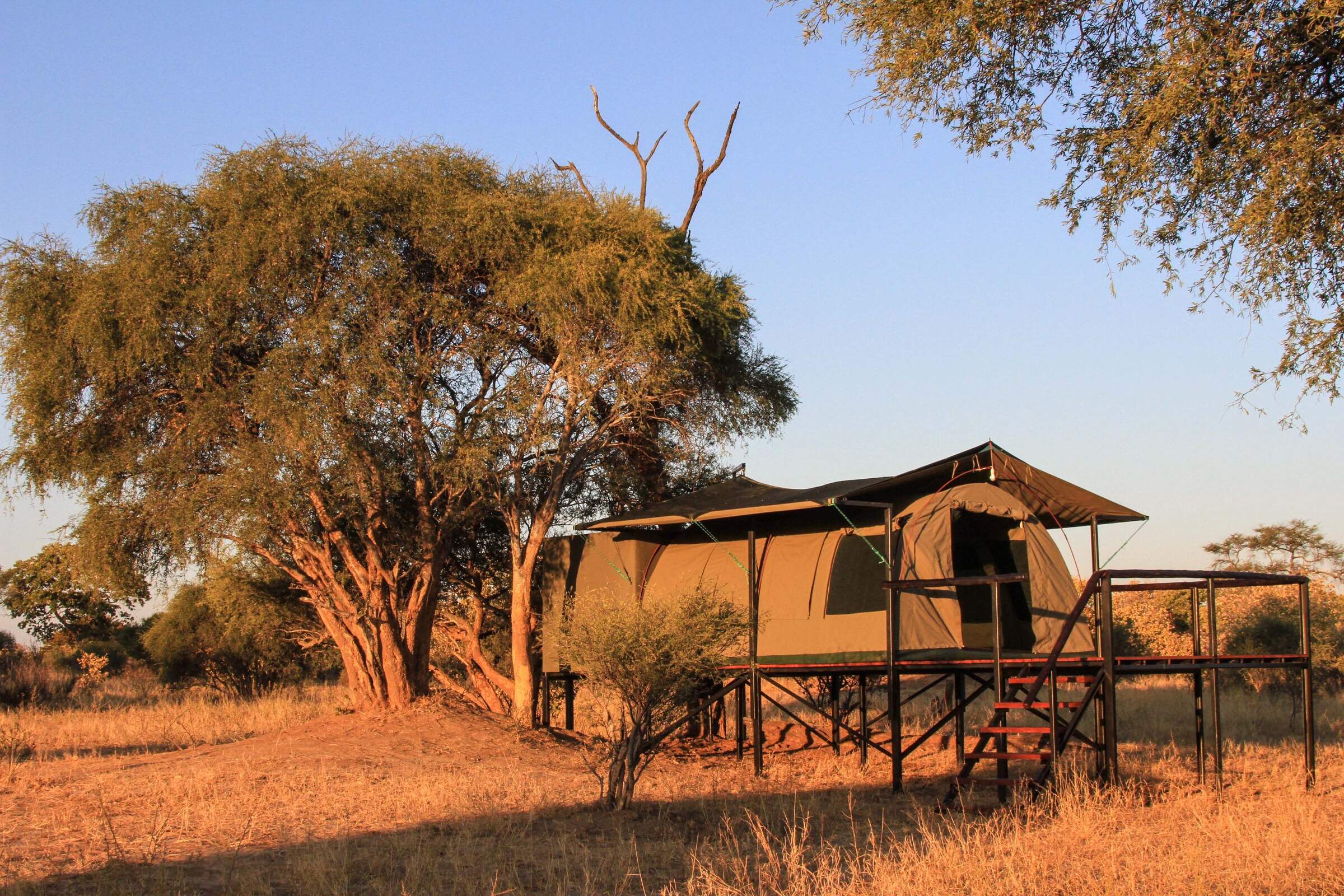
Jozibanini Camp
Remote and rugged, Jozibanini is one of the most remote camps in Zimabwe's largest National Park. Stay here for a real wilderness experience.
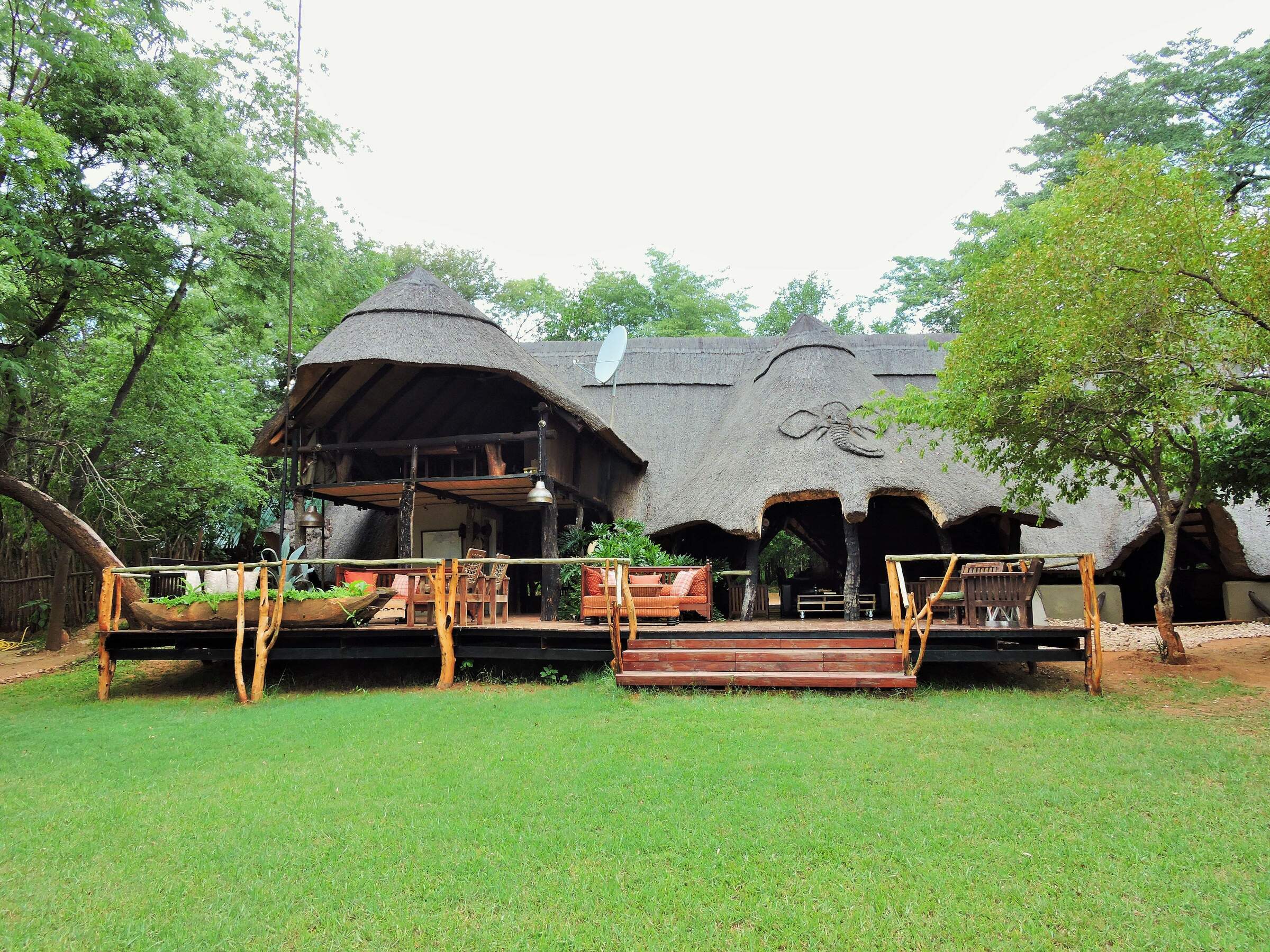
Ivory Lodge
Just outside Hwange National Park, the small Ivory Lodge is a great place to see large herds of elephant as well as smaller plains game.
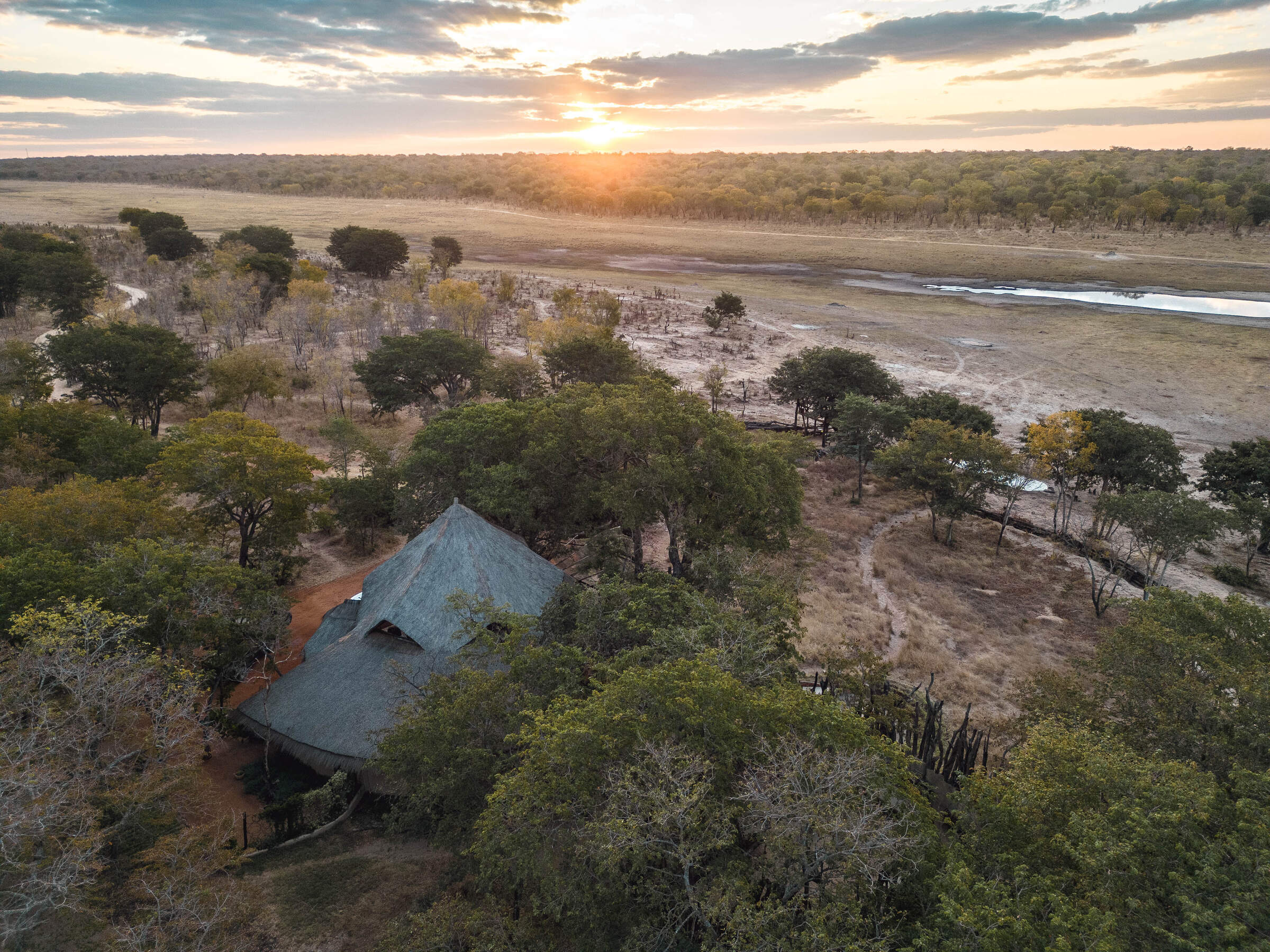
Sable Valley Lodge
Set on the 12km Dete Vlei, the recently upgraded and family-friendly Sable Valley sits in a private reserve within easy reach of Hwange National Park.
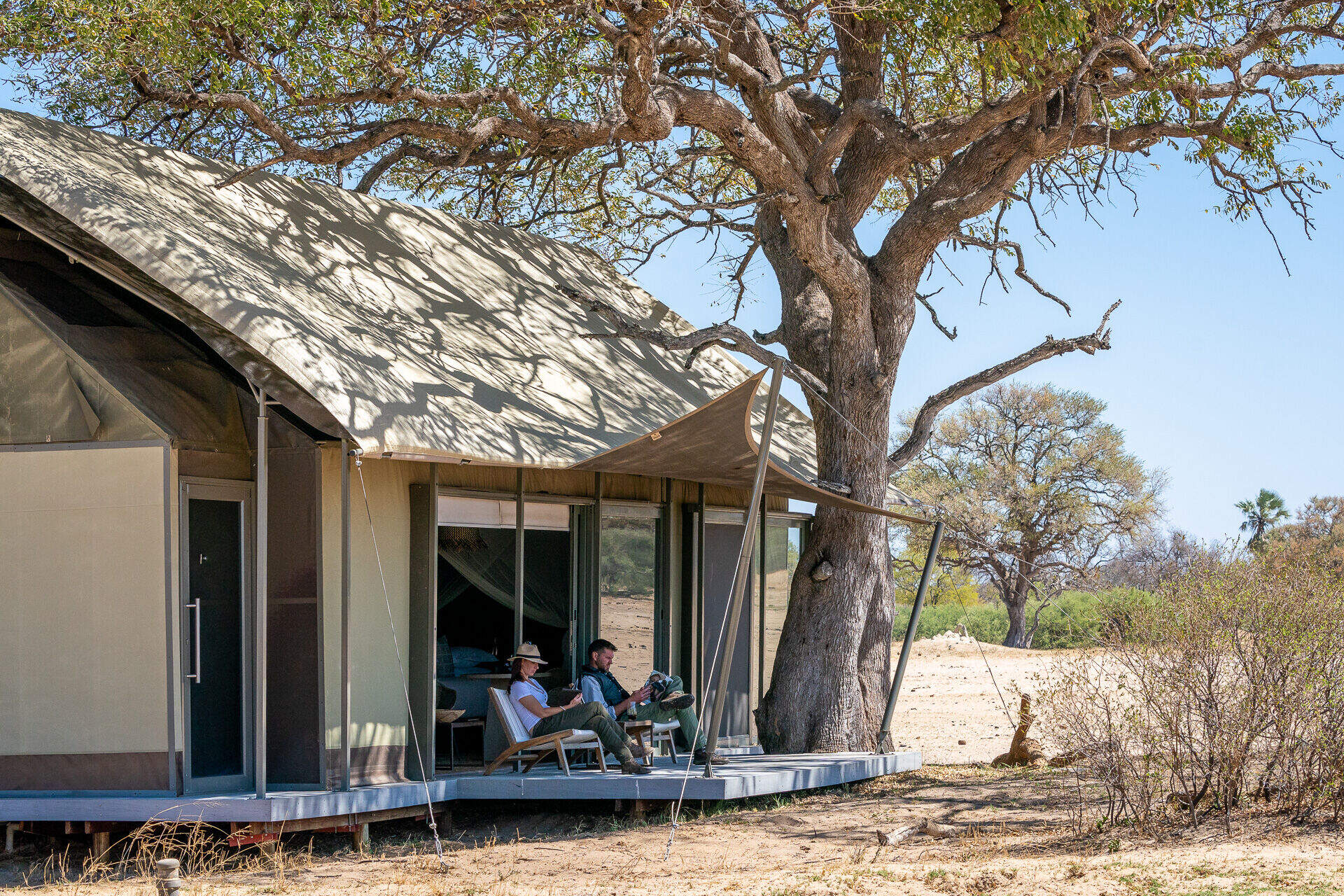
Linkwasha Camp
In its own private concession within Hwange National Park, Linkwasha offers excellent wildlife sightings and luxurious surroundings.
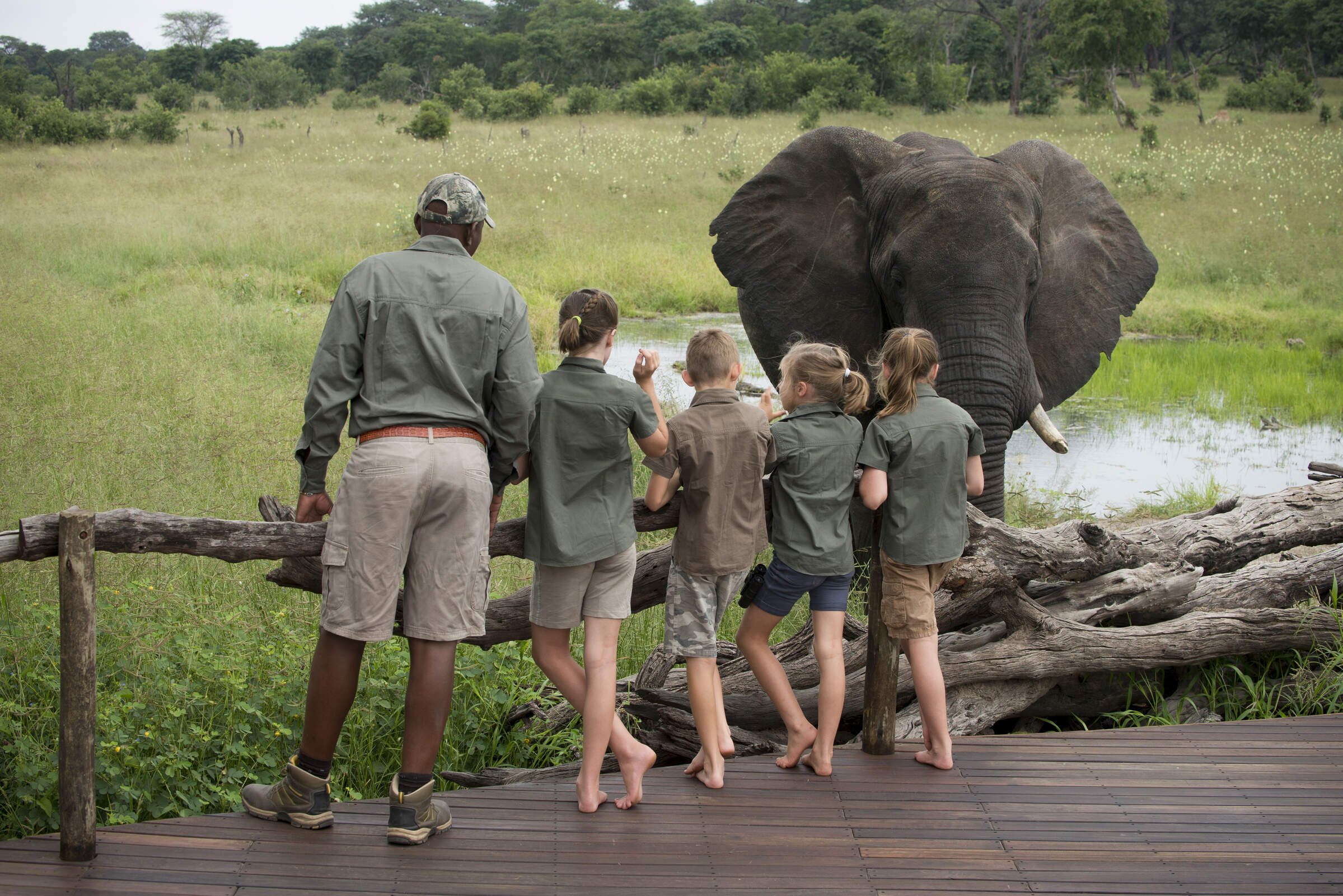
Somalisa Acacia
Somalisa Acacia is a family-friendly, yet remote and luxurious safari camp in Hwange National Park.
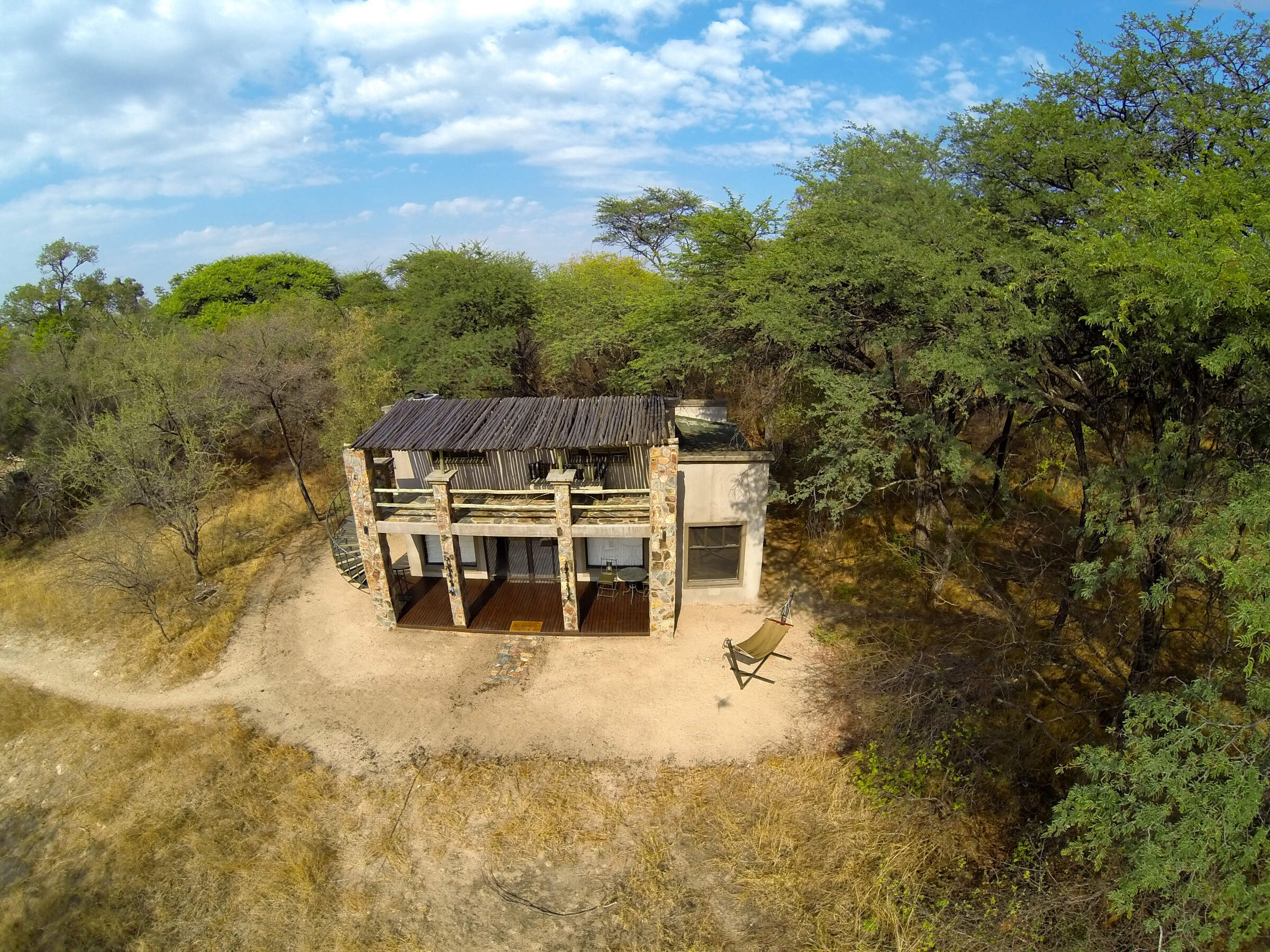
Camelthorn
Camelthorn is a stylish lodge with a range of activities in a remote region of western Zimbabwe, adjacent to Hwange National Park.
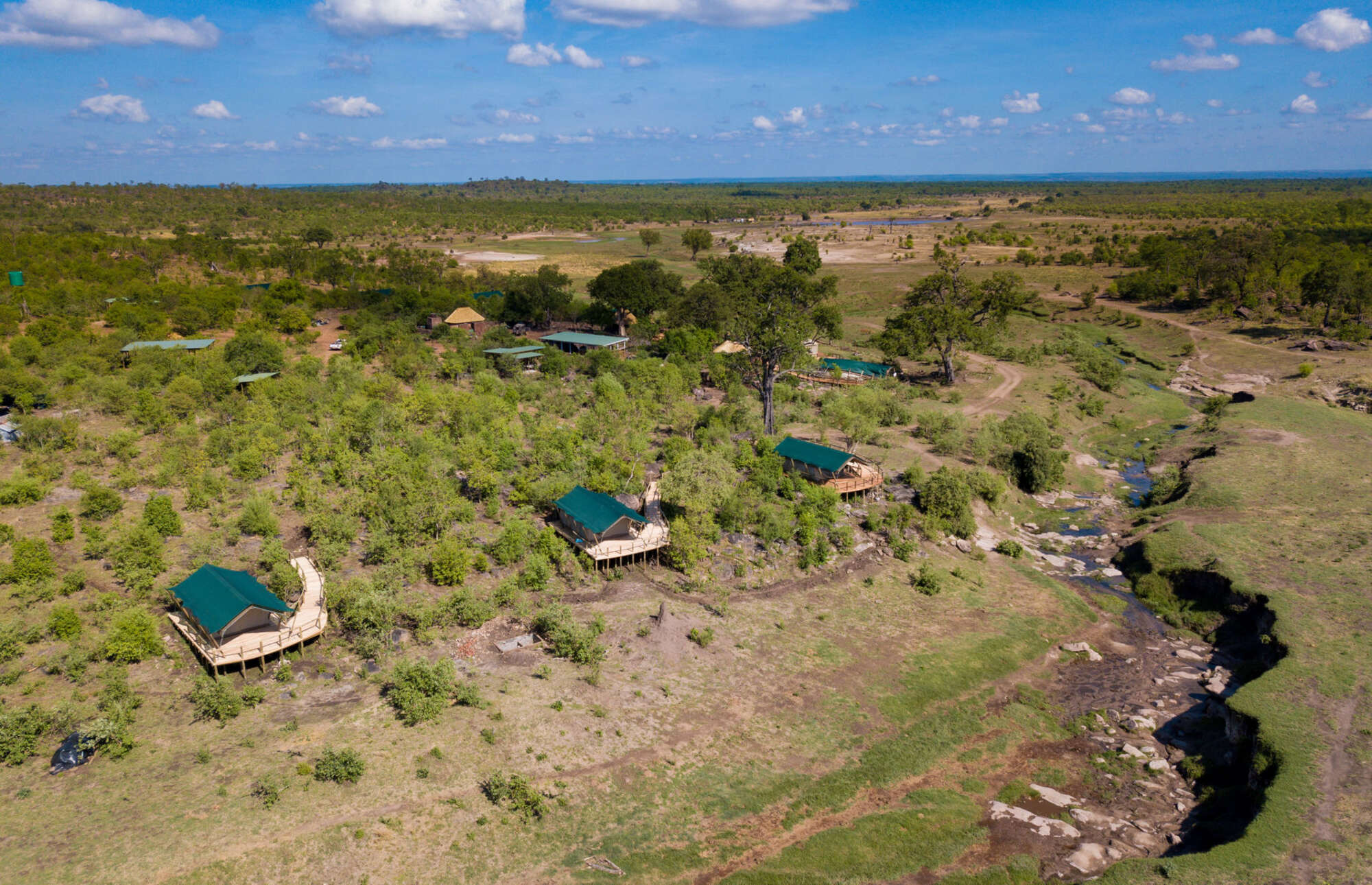
Deteema Springs Camp
In the remote north-west of Hwange National Park, Deteema Springs is a well-designed but unpretentious tented camp that offers good service and excellent wildlife potential.
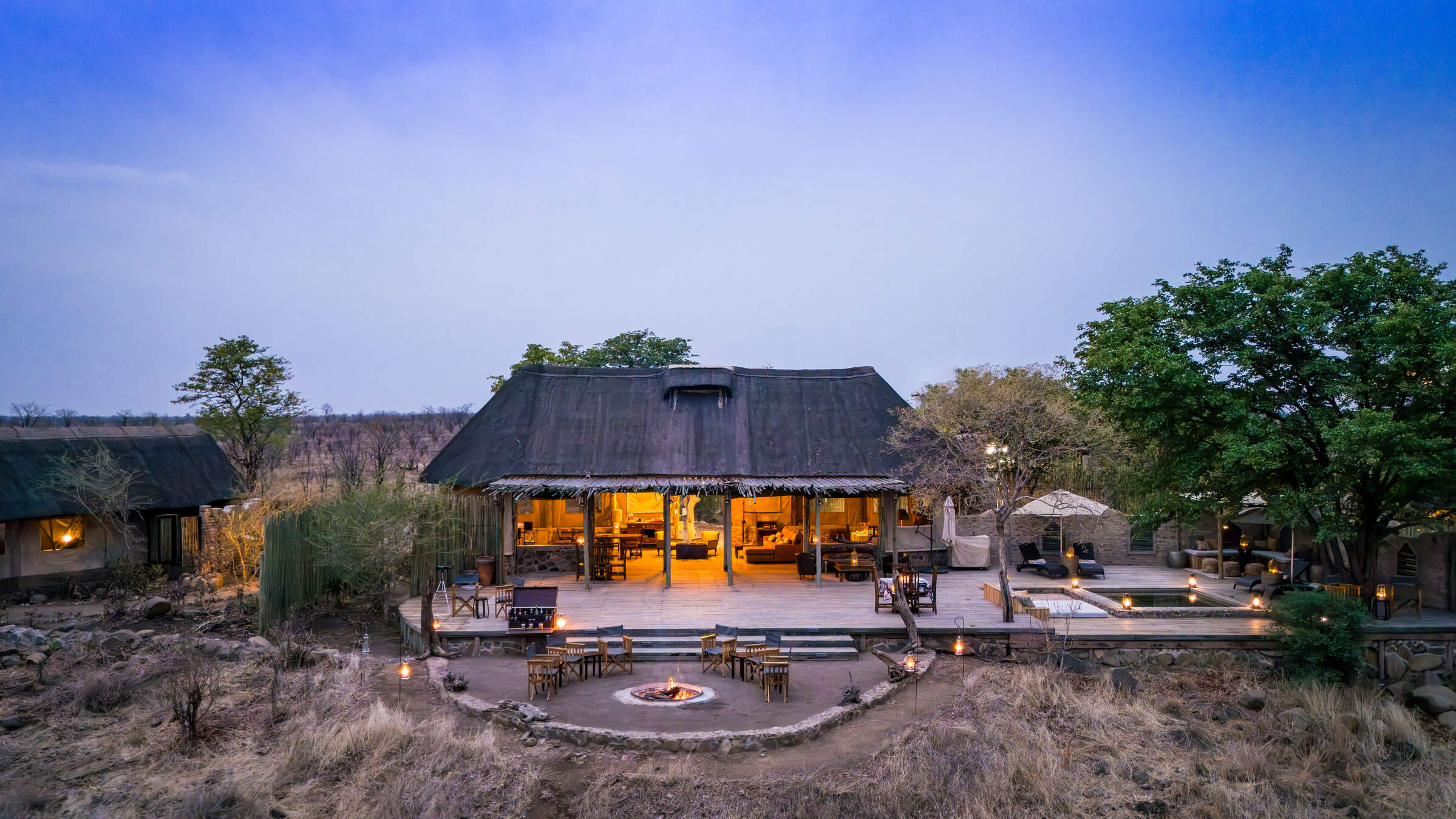
Daka Camp
One of the most remote camps in Hwange National Park, Daka Camp, like the smaller Daka Expeditions, sits almost on the border with Botswana.
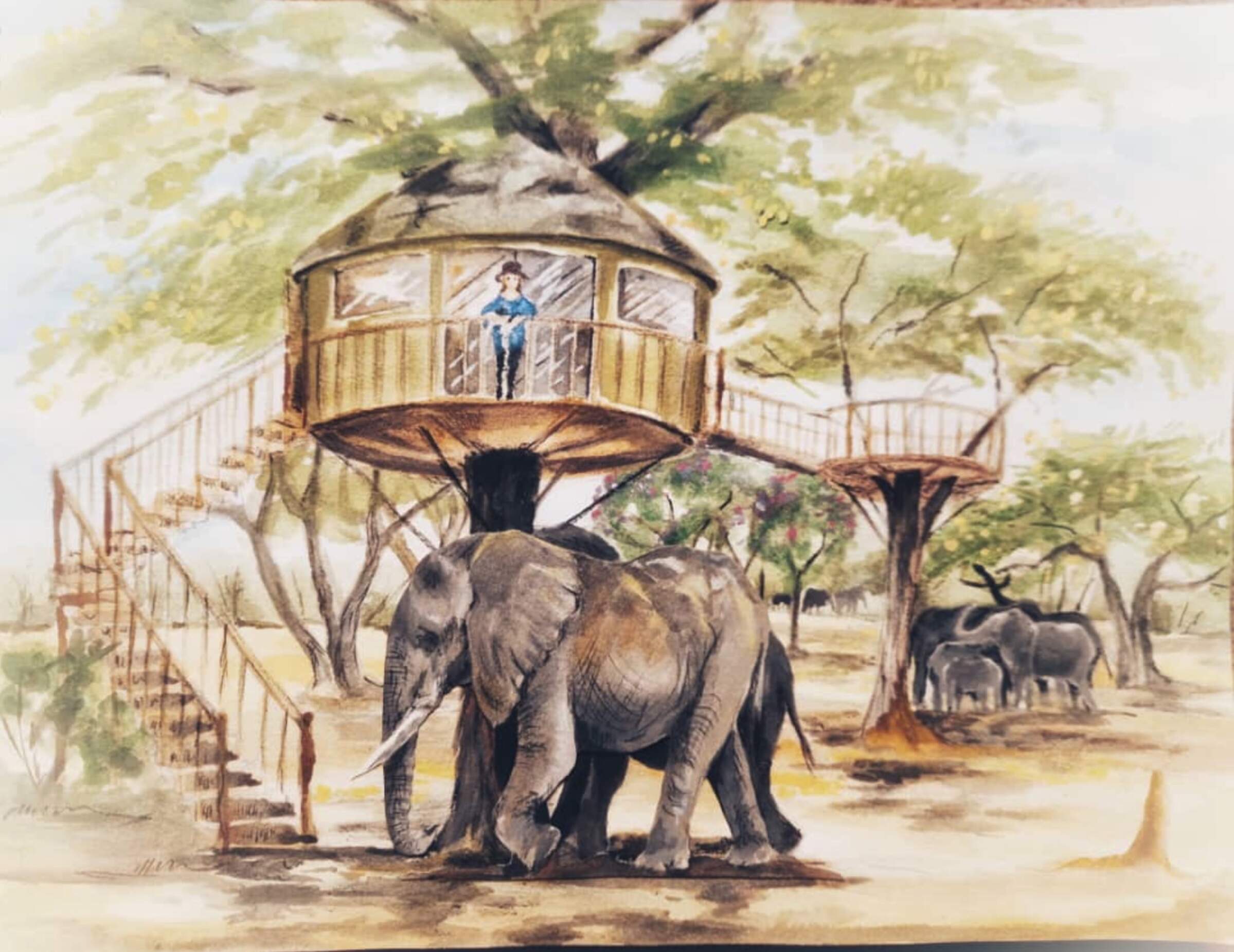
Tum Tum
The Tum Tum Treehouses are due to open in late 2025. Details on this exciting development are still scarce, so watch this space.
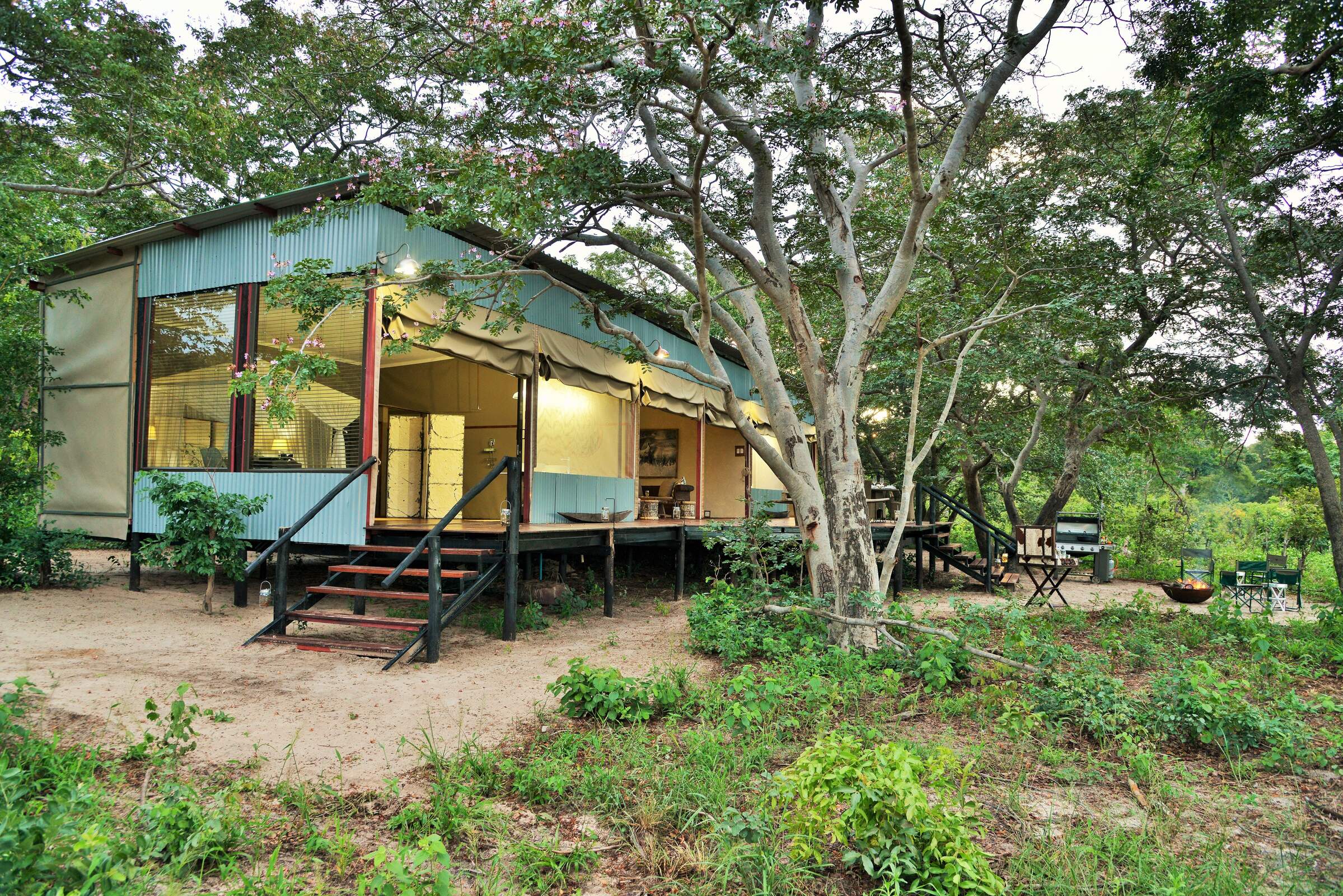
Khulu's Retreat
Just outside Hwange National Park, Khulu's Retreat is an exclusive private villa and is a great place to spoil yourself on a safari in Zimbabwe.
When to go to Hwange National Park
Our month by month guide: What it's like to visit Camp Chitubu in Hwange National Park
Jan
Feb
Mar
Apr
May
Jun
Jul
Aug
Sep
Oct
Nov
Dec
Zimbabwe in January
January falls in the middle of Zimbabwe’s rainy season and is the wettest month of the year. Heavy rainfall occurs most days, flooding seasonal rivers and waterholes, with the occasional sunny spell.
With the high levels of precipitation the wildlife in the national parks becomes widely dispersed, taking advantage of the abundance of food and water, and is easily hidden by the thick, green bush.
While sightings of larger animals are possible, and many species drop their young at this time, game viewing is often sparse. However, many migratory species of bird arrive in Zimbabwe making it a peak month for birding.
The rains create incredibly sticky mud in Mana Pools National Park, preventing access and causing camps to close for the season. The majority of the camps in other parks remain open, with low rates attracting a smattering of visitors.
- Peak of the rainy season: hot & humid with heavy rain most days
- Bush exceptionally thick and green, with poor game viewing
- Species such as impala drop their young
- All camps in Mana Pools closed
- Very few visitors, and low rates at open camps
Our view
A time to avoid if possible
Weather in January
Zimbabwe in February
February remains well within Zimbabwe’s rainy season. Although total rainfall drops, relatively short thunderstorms can still be expected most afternoons. On the plus side, there is a greater chance of some sunshine in-between.
Much of the country remains waterlogged, closing access to Mana Pools and severely restricting walking safaris in other parks. While game drives and canoeing remain an option, the abundance of water disperses animals, and thick grass can make it difficult to spot larger species, but birding remains excellent. Conversely, this is a great time of year to view the landscape, and is excellent for photographers. Sporadic cloud cover and clear air can make for some spectacular sunsets too, particularly over Lake Kariba and the Zambezi River where the reflections off the water add to the beauty.
- Generally wet with frequent thunderstorms & hot humid days
- Poor wildlife viewing due to dispersed animals & thick bush
- Clear air, green landscapes & exceptional sunsets
- All camps in Mana Pools closed
- Very few visitors & low rates at camps that are open
Our view
This is not a great time to visit
Weather in February
Zimbabwe in March
March is the final month of Zimbabwe’s rainy season, when the rains start to trail off and sunny days become the norm. However, some days the clouds can still build, breaking into thunderstorms in the afternoon.
Mana Pools remains closed throughout the month but the majority of camps in Hwange, Matusadona and Gonarezhou remain open. Here, the landscape is green and alive, with migrant species of birds taking advantage of the abundant insect life. Larger animals remain elusive though, and walking safaris remain restricted.
By this time of year, the rains have normally trickled down to the Zambezi River and the flow of water over the Victoria Falls starts to increase, but without kicking up too much spray to obscure the views.
- Last month of the rainy season: hot, humid days with occasional storms
- Lush vegetation means good birding, but poor game viewing
- Views of the Victoria Falls improve
- All camps in Mana Pools closed
- Open camps have few visitors & low rates
Our view
This is not a great time to visit
Weather in March
Zimbabwe in April
April marks the end of Zimbabwe’s rainy season and the end of summer. Clear skies are the norm, with just the occasional shower. Temperatures start to drop, failing to reach 30ºC most days and dropping down to around 10ºC at night.
As the rain fades the landscape starts to dry out. While the vegetation remains thick and green, the soil in Mana Pools dries enough for camps to open, and the only camps to remain closed are the most remote bushcamps in Hwange. Although viewing of larger animals remains tricky, the improved weather starts to draw back visitors, as do prices significantly below those in the peak season.
The Zambezi River and flow of water over the Victoria Falls is at its highest, although large amounts of spray diminish views of the waterfall itself.
- Transitional period, with much lower rainfall & falling temperatures
- Wildlife is still dispersed & hard to see, but sightings improving
- Views of the Victoria Falls often obscured by spray
- Camps in Mana Pools open
- Visitors start to return & camps increase their rates
Our view
A good time to visit, with pros & cons
Weather in April
Zimbabwe in May
The first month in the dry season, May is also Zimbabwe’s first month of winter. If the rains are particularly late in a given year, you may catch the odd shower, but you can expect clear and sunny days the majority of the time. While it’s warm in the daytime, temperatures drop to single digits at night, so bring a warm jumper and gloves for early morning drives.
With the rain having cleared the air, the sky is bright blue, and it’s the best time of year for photography.
Even the most remote camps in Zimbabwe are now open. With the lack of rainfall, vegetation dies back significantly, and seasonal rivers return to sand. Not only does this open up the possibility of walking safaris, but wildlife viewing becomes much more reliable.
- Start of the dry season, with milder days and cold nights
- Game viewing significantly improves as vegetation dies back
- Vegetation starts to turn from green to brown
- Best time for photography with crystal clear air
- Visitors start to return; all camps open & rates increasing
Our view
A very good time to visit
Weather in May
Zimbabwe in June
During June you can virtually be guaranteed of dry and sunny days, although temperatures continue to drop, and can get close to freezing at night in Hwange National Park. Jumpers, jackets and gloves are strongly recommended for early mornings and evenings.
The opportunities for wildlife viewing improve throughout the month as the landscape rapidly dries, and the animals start to gather on the banks of the Zambezi River and around Hwange’s waterholes.
Water levels in the Zambezi River start to drop, reducing the amount of spray kicked up at the Victoria Falls and greatly improving visibility, but still allowing a full curtain of water to cascade over the edge.
- Middle of winter, with night-time temperatures close to freezing
- Game viewing significantly improves throughout the month
- Views of the Victoria Falls are at their best
- Noticeable increase in visitor numbers
- Camps considerably more expensive
Our view
A very good time to visit
Weather in June
Zimbabwe in July
July sits in the middle of Zimbabwe’s dry season. Although it’s warm at midday, temperatures are generally cold and in Hwange it’s been known to drop below freezing at night, with the lower-altitude Mana Pools feeling a bit warmer.
With wildlife clustering around the few remaining waterholes, sparse vegetation, and some of the best views of the Victoria Falls, this is one of the most popular times to travel, with camps charging peak season rates to reflect this. That said, visitor numbers to the country in general remain low, and outside of the Victoria Falls it’s rare for any areas to feel crowded.
- Middle of the dry season with almost no chance of rain
- Clear sunny days, but very cold nights
- Wildlife viewing good; game drives and walking safaris unrestricted
- Views of the Victoria Falls at their best
- Camps charging peak season rates
Our view
A very good time to visit
Weather in July
Zimbabwe in August
While August is the end of winter and temperatures are starting to creep up, mornings and nights are still cold, and game drives in open vehicles can feel particularly chilly. Well into the dry season, the landscapes will have mostly transformed from green to brown and wildlife viewing in Zimbabwe’s national parks is approaching its best. Due to dust kicked up into the atmosphere and smoke from bush fires you may start to notice a haze on the horizon, but this doesn’t significantly impact photography.
August is one of the most expensive months, and the pleasant weather and decent game viewing attracts lots of visitors. While the national parks rarely feel crowded, Victoria Falls accommodation can sell out a year in advance.
- Warm, sunny days but cold mornings & nights; almost no chance of rain
- Wildlife viewing nearly at its best
- Landscape turns brown, & an atmospheric haze develops
- All camps charging peak season rates
Our view
Fantastic: the very best time to visit
Weather in August
Zimbabwe in September
Temperatures in September rarely drop below 15ºC, but are yet to reach the oppressive highs of summer. It will normally have been five months since the last drop of rain, so antelope and elephants cluster around whatever water remains, with predators never too far away.
The landscape is very brown, and the haze building on the horizon takes some of the colour out of the sky, so while animal subjects are plentiful, the background is not ideal for photography.
The combination of incredible wildlife viewing, hot and sunny weather, and cheaper flights outside of the school holidays make this the most popular time of year to travel, and availability at the camps can become limited up to a year in advance.
- The best month for weather, with a pleasantly warm temperature range
- One of the best months for game viewing
- Victoria Falls starting to dry but still impressive on Zimbabwean side
- All camps are charging peak season rates
- Most popular time to travel, & space can be limited
Our view
Fantastic: the very best time to visit
Weather in September
Zimbabwe in October
October is the last month of the dry season with little chance of rain but building humidity. While the higher elevation of Hwange National Park limits temperatures to the 30s Celsius, they can easily top 40ºC in Mana Pools.
With little vegetation or water, wildlife is drawn to the few remaining water sources and viewing is at its best; visitors who brave the heat can be rewarded with some exceptional sightings, although haze in the air diminishes photos. Maximum visibility and dense wildlife concentrations can also make for very rewarding walking safaris, although the heat can make them uncomfortable.
Water levels in the Zambezi at the Victoria Falls drop significantly, and large stretches of the waterfall are a dry cliff-face – although it never dries completely. Camp rates remain at their peak, but visitor numbers drop as people avoid the heat.
- Last month of the dry season; very hot with building humidity
- Wildlife viewing at its very best
- Dust & smoke in the air diminish photographic opportunities
- Victoria Falls starting to look very dry
- Camp rates remain at their peak
Our view
A very good time to visit
Weather in October
Zimbabwe in November
November is a transitionary period, with high temperatures and humidity. While they can’t be predicted with any precision, the first rains normally arrive halfway through the month, in the form of thunderstorms lasting a few hours each day.
Early November is a popular time to travel as the camps drop their rates, so if you’re lucky you can get peak-season game viewing at low-season rates. This is a gamble though as if the rains do arrive, animals are no longer limited to a few dangerous waterholes and will disperse into the bush. While all the camps in Mana Pools intend to remain open, the rains can make the airstrips unusable so you may find yourself moved to a different park, a risk that increases through the month.
- Typically the start of the rains in Zimbabwe
- Temperatures & humidity levels remain high
- Wildlife viewing rapidly diminishes as the rains arrive
- Camps remain open, but risk early closure in Mana Pools
- Much cheaper time to travel as camps drop their rates
Our view
A good time to visit, with pros & cons
Weather in November
Zimbabwe in December
By December the rainy season has begun in earnest; this is one of the wettest months in Zimbabwe, with heavy thunderstorms most afternoons and occasionally continuous rain for a couple of days. While temperatures start to cool down the high levels of humidity can make the heat feel more oppressive.
With the rains comes an explosion of green growth, and the dust and smoke are washed out of the air. The resulting scenery – with the occasional bright blue skies – can be fantastic for photographers. Thick vegetation and plentiful water makes viewing of larger animals tricky, but with migratory species arriving the birding is at its best.
All camps in Mana Pools and the remote Hwange camps close, with those remaining open charging their lowest rates.
- One of the wettest months in Zimbabwe
- High temperatures & levels of humidity
- Wildlife viewing poor, but birding good
- Lush green landscapes & clear air; great for landscape photography
- All camps in Mana Pools closed
Our view
This is not a great time to visit
Weather in December

Looking for inspiration on where to travel next?
Visit our trip chooser to explore your options and find inspiration for your perfect African adventure
Inspire me